- Link to facebook
- Link to linkedin
- Link to twitter
- Link to youtube
- Writing Tips

How to Write an Expository Essay
4-minute read
- 29th March 2020
An expository essay explains something. This means investigating an idea, looking at evidence, coming to a conclusion, and explaining your thinking. But how do you write a strong expository essay? Our top tips include:
- Read the essay prompt carefully and using it to guide your research.
- Come up with a thesis statement (i.e., a position that you’ll explain).
- Plan the structure of your essay before you start writing.
- Once you have a first draft, revise and proofread to make sure it is perfect.
For more advice on how this works, check out the guide below.
1. Read Your Essay Prompt
Most expository essay prompts will ask you to do one of the following:
- Define and explain a concept or theory.
- Compare and contrast two ideas.
- Examine a problem and propose a solution.
- Describe a cause and effect relationship.
- Explain a step-by-step process.
- Analyze a broad subject and classify examples into groups.
When you’ve been set an expository assignment, then, check the prompt or question carefully. You can use the phrasing to guide your research. You may also need to select a topic to write about. If so, try to think of something:
- You already know at least something about.
- You find interesting enough to research.
- That fits with the instructions in the essay prompt (e.g., if you’ve been asked to contrast two things, you’ll need a topic that allows for a comparison).
- That is narrow enough to discuss in one essay.
Start by brainstorming topics, then narrow it down to one or two ideas.
2. Come Up with a Thesis Statement
Once you have a topic, you’ll need to do some research and develop a thesis statement. This is the proposition or position that you’ll explain in your essay.
Your thesis statement should be something you can back up with evidence and facts, as well as something that answers the question in your essay prompt. Keep in mind, too, that an expository essay should present a balanced account of the facts available, not personal opinions. For instance, we’ve come up with thesis statements for a few example essay prompts:
When you’ve selected a thesis, make sure you’ve got evidence to back it up! This may mean doing a little more research before you start writing.
Find this useful?
Subscribe to our newsletter and get writing tips from our editors straight to your inbox.
3. Structuring an Expository Essay
The exact length and content of your essay will depend on the topic and prompt. However, most expository essays follow a similar basic structure:
- Introduction – A paragraph where you introduce the essay topic and your thesis statement (i.e., the issue or idea you will explain in the essay).
- Main Body – A series of short paragraphs in which you explain your thesis statement, providing evidence and arguments to support each point.
- Conclusion – A final paragraph where you restate your thesis and how your evidence supports this. Try not to introduce any new information here (if it’s important, it should go in the main body).
- References – If required, include a bibliography of sources you’ve used.
Before you start writing, then, create an essay outline with the structure above in mind and plan what each paragraph will say.
4. Editing and Proofreading
When you have a first draft, take a break and re-read it. Now comes the redrafting ! This is where you go back over your essay and look for areas to improve. Do you provide enough evidence? Is your argument clear? Even a few tweaks may increase your mark, so make sure to redraft at least once!
Finally, make sure to have your essay proofread before you submit it for marking. This will ensure your writing is error free and easy to read, giving you an even better chance of getting the grades you deserve.
Share this article:
Post A New Comment
Got content that needs a quick turnaround? Let us polish your work. Explore our editorial business services.
9-minute read
How to Use Infographics to Boost Your Presentation
Is your content getting noticed? Capturing and maintaining an audience’s attention is a challenge when...
8-minute read
Why Interactive PDFs Are Better for Engagement
Are you looking to enhance engagement and captivate your audience through your professional documents? Interactive...
7-minute read
Seven Key Strategies for Voice Search Optimization
Voice search optimization is rapidly shaping the digital landscape, requiring content professionals to adapt their...
Five Creative Ways to Showcase Your Digital Portfolio
Are you a creative freelancer looking to make a lasting impression on potential clients or...
How to Ace Slack Messaging for Contractors and Freelancers
Effective professional communication is an important skill for contractors and freelancers navigating remote work environments....
3-minute read
How to Insert a Text Box in a Google Doc
Google Docs is a powerful collaborative tool, and mastering its features can significantly enhance your...

Make sure your writing is the best it can be with our expert English proofreading and editing.
Expository Essay: 3 Building Blocks to Propose an Idea and Defend It
by Dixie-Ann Belle | 0 comments
If you saw the words “expository essay” on a writing assignment, would your mind draw a blank? Would you immediately feel as if you had stumbled into unexplored territory?
Well there's good news.
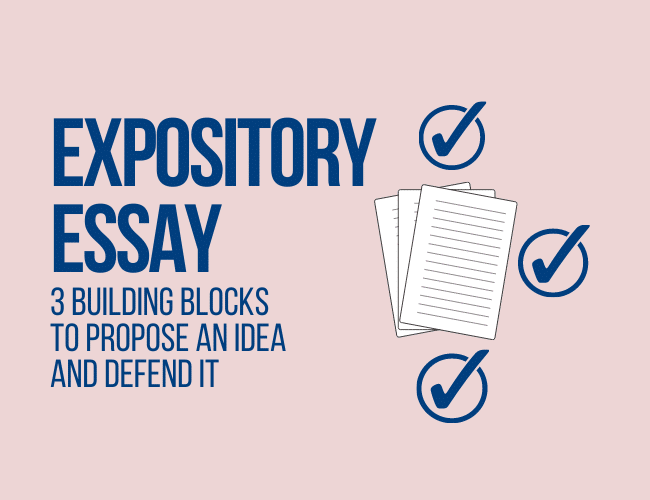
This post is written by guest writer Dixie-Ann Belle. You can learn more about Dixie-Anne at the end of this article. Welcome Dixie-Ann!
You might not realize it, but chances are this is not your first encounter with this type of essay. Once you have been writing essays in academic environments, you have probably already worked on expository writing.
In this article, I hope to help you recognize this essay type and understand the expository essay outline. Comprehending the building blocks is instrumental in knowing how to construct an exceptional expository essay.
Lay a Strong Foundation
Over the years, I have taught and tutored college students one on one as they write academic essays, in face to face classrooms and online, and I have noticed a pattern. They often approach essays in one of two ways.
Some consider them with apprehension and are fearful of making mistakes. Others feel confident that they have written many essays before and think they have already mastered expository writing.
Interestingly, it's the latter who often end up the most shaken when they realize that they are not as familiar as they think with this type of writing.
What I hope to instill in my students is that they should not feel intimidated whatever their situation or essay assignment.
I encourage them to make sure they understand the foundations of the expository essay structure. I try to get them to grasp the basic blocks that need to be there, and once they do, they have a good chance of crafting a substantial piece of writing.
What is an Expository Essay?
Students are typically assigned one of at least four types of essays: the persuasive/argumentative essay, the descriptive essay, the technical essay, or the expository essay.
Writing an expository essay is one of the most important and valuable skills for you to master.
According to the Purdue Online Writing Lab:
The expository essay is a genre of essay that requires the student to investigate an idea, evaluate evidence, expound on the idea, and set forth an argument concerning that idea in a clear and concise manner.
Keep in mind that your expository writing centers on giving your reader information about a given topic or process. Your goal is to inform, describe, or define the subject for your readers.
As you work to achieve this, your essay writing must be formal, objective, and concise. No matter what your discipline, it's almost guaranteed that you will be required to write this common type essay one day.
Some expository essay examples could include:
- Define the term ‘democracy'
- Compare and contrast the benefits of cable television vs streaming
- Outline the process that generates an earthquake
- Classify the different types of tourism
- Outline the aspects of a good fitness program
The possibilities are endless with expository writing, and it can cover a wide variety of topics and specialties.
3 Building Blocks of a Great Expository Essay
To make sure you're on the right track with this type of paper, it helps to understand the three building blocks of the expository essay format and how to apply them to the final expository essay structure .
1. Write an introduction
Most students know that an introductory paragraph should grab the interest of the reader. However, they might not realize that it should also provide context for the essay topic.
Ask yourself : What are you talking about in this essay? Why is this topic important? Some background details could help to establish the subject for your reader.
For example:
If you were writing an essay on the impact smartphones have on society, you might want to start with some information on the evolution of smartphones, the number of smartphones in society, the way people use the phones and more.
The introduction should start off with general information.
You then work your way down to the more specific and principal part of your introduction and the crown of your whole essay, the thesis statement.
What is the thesis statement?
Your thesis statement states in concise language what this essay is going to be about. It is one clear sentence which expresses the subject and the focus of this piece of writing. If there is a prompt, the thesis statement should directly answer that prompt.
Our smart phones topic might create a thesis statement like: Smart phones have many positive impacts for adults in the business world.
Right away the reader has some idea of what's ahead.
2. Write your body paragraphs
With your thesis statement clear in your mind and your introduction setting the scene, it is time to write your body paragraphs.
Each body paragraph contains supporting information including factual evidence for your essay topic. Each paragraph should each focus on one idea.
Depending on your word count and the teacher requirements, you can write any number of body paragraphs, but there are usually at least three for a basic five paragraph essay.
Each body paragraph should start with a topic sentence. A topic sentence is one single statement that explains the point of the paragraph. It directly refers to your thesis statement and tells you what the body paragraph is going to be about.
Remember our smart phone thesis statement? You need something that will relate to that thesis sentence and will alert the reader to what is to come.
Here's one possibility:
Smart phones can help increase productivity for professional adults.
This topic sentence not only reminds us that you are talking about positive impacts for adults with smart phones, it now shows us what the following paragraph will cover.
The best body paragraphs will go on to include different types of details, all of which would support your topic sentence. A good abbreviation to encapsulate the different details is spelt TEEES.
The TEEES Body Paragraph Structure
Let's break down this abbreviation and explore the types of details you'll need in your body paragraphs
T: Topic sentence
You'll begin with your topic sentence establishing the purpose of this paragraph. We'll use our example from above:
Smartphones can help increase productivity for professional adults.
E: Explanation
This is where you expand on your topic and include additional supportive information.
If you were talking about smartphones and productivity, maybe you could mention what elements of the smartphone make it optimal for productivity.
E: Evidence
This is the information from reputable sources you researched for your topic. Here's where you can talk about all the information you have discovered from experts who have carefully studied this subject.
For our smartphone essay, perhaps you could mention a quote from a technology reporter who has been following the rise of smartphones for years.
E: Examples
This would be concrete subject matter to support your point.
Maybe here you can list some of the smartphone apps which have proven to increase productivity in the workplace.
S: Significant/Summarizing sentence
This is the last sentence in the body paragraph which summarizes your point and ends this part of your essay. There should be no doubt in the reader's mind that you have finished talking about your topic, and you are moving on to another in the next paragraph. Here's how we could conclude this paragraph on smartphones and productivity:
Smartphones have transformed the productivity of the modern workforce.
3. Write the conclusion
Once you have written your body paragraphs, you're in the home stretch. You have presented all of your points and supported them with the appropriate subject matter. Now you need to conclude.
A lot of students are confused by conclusions. Many of them have heard different rules about what is supposed to be included.
One of the main requirements to keep in mind when ending an expository essay is that you do not add new information.
This is not the time to throw in something you forgot in a previous body paragraph. Your conclusion is supposed to give a succinct recap of the points that came before.
Sometimes college students are instructed to re-state the thesis, and this puzzles them. It doesn't mean re-writing the thesis statement word for word. You should express your thesis statement in a new way.
For example, here's how you could approach the conclusion for our smartphone essay.
You've come up with three points to support your thesis statement, and you've explored these three points in your body paragraphs. After brainstorming, you might decide the benefits of smartphones in the workplace are improved productivity, better communication, and increased mobility.
Your conclusion is the time to remind your reader of these points with concise language. Your reader should be able to read the conclusion alone and still come away with the basic ideas of your essay.
Plan Your Essay Based on an Expository Essay Outline
While writing fiction, it is sometimes okay to “pants” it and just leap into writing your story.
When writing essays in academia, this is rarely a good idea. Planning your essay helps organize your ideas, helps you refine many of your points early on and saves time in the long run.
There are lots of great brainstorming techniques you can use to get your ideas together, but after that, it's time to create a topic to sentence outline.
There are three steps to creating your topic to sentence essay outline.
- Develop a powerful thesis statement. Remember, this is the overarching idea of your entire essay, so you have completed a significant step once you have one done.
- Come up with the ideas you would like to support your thesis statement.
- Based on your points, craft your topic sentences.
Here is an example of a topic to sentence outline:
Having these important foundation details completed is a great way to develop your essay as you build on each part. It is also an effective method to make sure you are on the right track.
Depending on your instructor (or tutor, if you have one), you can show your outline to them to get feedback before you launch into your entire essay.
Even if you don't have anyone to provide a critique, the outline can make it easier to revise how you will approach the rest of your paragraph essay.
You now have some firm foundations to help you as you construct your expository essay.
How do you organize an expository essay? Let us know in the comments .
Take fifteen minutes to practice writing your own expository essay.
First, choose an expository writing assignment topic. If you can't think of one, use one of the expository essay examples below .
- What are the nutritional elements of a healthy breakfast?
- What are some of the most influential types of music?
- Compare and contrast the benefits of electric and gas cars.
- What are the major steps to planning a stress-free vacation?
- How do smartphones affect mental health?
- Define true love.
Craft a thesis statement about your topic. Then, write three topic sentences for your body paragraphs.
With the time you have left, start writing your essay. You might be surprised how much you can write in fifteen minutes when you have a clear outline for your essay!
When your time is up, share your outline and your essay in the Pro Practice Workshop here . After you post, please be sure to give feedback to your fellow writers.
Happy writing!

Dixie-Ann Belle
Since she started scribbling stories in her notebooks as a child, Dixie-Ann Belle has been indulging her love of well crafted content. Whether she is working as a writing teacher and tutor or as a freelance writer, editor and proofreader, she enjoys helping aspiring writers develop their work and access their creativity.
Submit a Comment Cancel reply
Your email address will not be published. Required fields are marked *
Submit Comment
Join over 450,000 readers who are saying YES to practice. You’ll also get a free copy of our eBook 14 Prompts :
Popular Resources
Book Writing Tips & Guides Creativity & Inspiration Tips Writing Prompts Grammar & Vocab Resources Best Book Writing Software ProWritingAid Review Writing Teacher Resources Publisher Rocket Review Scrivener Review Gifts for Writers
Books By Our Writers

You've got it! Just us where to send your guide.
Enter your email to get our free 10-step guide to becoming a writer.
You've got it! Just us where to send your book.
Enter your first name and email to get our free book, 14 Prompts.
Want to Get Published?
Enter your email to get our free interactive checklist to writing and publishing a book.
Home / Guides / Writing Guides / Paper Types / How to Write an Expository Essay
How to Write an Expository Essay
Every student has to write an expository essay at least once in their educational career. These are actually fairly simple essays to write, but they do require some serious research skills. Like most academic essays, the expository essay requires formal writing with an introduction, body, and conclusion.
Guide Overview
- Focus on the thesis
- Listen to the assignment
- Explain, don’t argue
- Revise and edit, revise and edit
- Choosing the right topic
Tips for Writing a Kick-Butt Essay
Want to really impress your professor? Here are a few ways you can turn an ordinary essay into something that will blow their socks off.
Focus on the Thesis
Your thesis is the central point of the entire essay, so if it’s amazing, you’re off to a great start. Begin with this and make sure you decide on something that is impressive to kick off the essay.
Listen to the Assignment
Your professor may give you hints on what they’re looking for. If you just write down the basics of the assignment, you could miss out on some key points. For example, your professor may hint at a preferred topic or give tips that could result in a higher score. Write it all down and then analyze what is wanted before you write.
Long before you actually put pen to paper or fingers to keyboard to write the essay, you need to complete the pre-writing phase. This is where you do research and outline your essay. You’ll be amazed at how much better your writing is when you have these basic elements in place first. If you need help with these basic elements consider using an Expository Essay Template.
Explain, Don’t Argue
If you’re not careful, an expository essay can turn into a persuasive or argumentative essay. Focus on explaining the topic, rather than convincing people of something about it.
Revise and Edit, Revise and Edit
Going over the essay once to edit and polish isn’t really enough. If you’re tight on time, such as when writing an essay for an exam, just once will do. However, if you have time, it’s a good idea to edit immediately, then let the essay sit overnight or even longer. When you come back, you won’t be as close to the writing and can look at it more objectively.
Choosing the Right Topic
Topics for an expository essay vary widely, but ideally, you should select something you’re interested in writing about. Topics can answer a question such as “How can we prevent bullying in school?” or they can describe something like a historical building in your area. Other interesting topics to inspire you include:
- How does technology affect our relationships?
- How to treat a burn
- What are the must-haves for a freshman in college?
- How to handle anxiety attacks naturally
- How to train your dog to stop barking on command
- Research the history of a monument in your area
- Why roller skating is a great exercise
As you can see, there’s no limit to the types of topics you can choose for your essay and it really comes down to what the professor assigns you and what you enjoy writing about. How narrow your topic is will also depend on how much you plan to write. An entire history of the Civil War won’t fit into two page, for example, so you’ll need to narrow it down to a specific battle or element of the Civil War.
Writing an expository essay can actually be a fun experience if you approach it the right way. When you enjoy the topic and are interested in it, your essay will show that and will stand out from those written out of boredom.
Finally, if you’re ever facing writer’s block for your college paper, consider WriteWell Essay Templates to help you get started.
EasyBib Writing Resources
Writing a paper.
- Academic Essay
- Argumentative Essay
- College Admissions Essay
- Expository Essay
- Persuasive Essay
- Research Paper
- Thesis Statement
- Writing a Conclusion
- Writing an Introduction
- Writing an Outline
- Writing a Summary
EasyBib Plus Features
- Citation Generator
- Essay Checker
- Expert Check Proofreader
- Grammar Checker
- Paraphrasing Tools
Plagiarism Checker
- Spell Checker
How useful was this post?
Click on a star to rate it!
We are sorry that this post was not useful for you!
Let us improve this post!
Tell us how we can improve this post?
Grammar and Plagiarism Checkers
Grammar Basics
Plagiarism Basics
Writing Basics
Upload a paper to check for plagiarism against billions of sources and get advanced writing suggestions for clarity and style.
Get Started
How to Write an Expository Essay Better, Faster, and In a More Satisfying Manner

Mark Bradford
What Is an Expository Essay?
If you find yourself here, it's likely because you've recently received an assignment for an expository essay, or perhaps you're drawn to exploring ideas beyond the surface level. Whatever the reason, we're here to guide you through the expository essay definition, its outline, and examples.
Let's start by understanding what an expository essay is and its purpose. In simple terms, an expository essay provides information on a particular topic, elucidating aspects of a situation, person, idea, or event and conveying knowledge to the reader. Unlike persuasive writing, it doesn't seek to sway the audience's opinion but relies on facts to inform and educate about the subject.
From sharing personal experiences to outlining work assignments, expository writing covers a broad spectrum of questions, making it arguably the most prevalent form of writing worldwide. If at any point you feel overburdened with assignments, use our essay writing services to relax and wrap up your homework faster.

Why Students Have to Write Expository Essays?
Expository writing serves a distinct purpose – to impart knowledge to the reader. While it may offer entertainment or persuasion as secondary benefits, these are not the primary objectives of the author. A well-crafted piece of expository writing showcases the author's expertise on the subject and often reveals their journey of acquiring knowledge.
For instance, consider the task of crafting an essay about a mock trial your class conducted. In an expository essay, you would begin by introducing the assignment and detailing the case your class tackled during the trial. Subsequent body sections would systematically elaborate on each stage of the mock trial process – covering discovery, opening statements, cross-examination, closing statements, jury deliberation, and the final verdict – illustrating how your class navigated through each phase. Concluding the essay, you would present the verdict reached by your class and the judge's ruling.
Crucially, your expository essay on the mock trial does not take a stance on whether the ruling was right or wrong. Instead, it elucidates the procedural intricacies your class followed, offering a comprehensive understanding of how real court cases progress through the legal system. In essence, your essay is a presentation of facts and processes rather than expressing personal opinion or commentary.
Types of Expository Essays
As previously noted, expository essays manifest in various forms. These encompass the following types:
Classification
In the realm of classification essays, you delve into various subjects within a single category, examining the distinctive characteristics of each subject while highlighting the traits that connect them to others in the same category. For instance, a classification essay on herding dogs could commence with a thesis statement elucidating the differences between herding breeds from other dog categories. Subsequent paragraphs would then delve into specific herding breeds, such as corgis, collies, heelers, and more.
A definition essay elucidates its subject by presenting factual data. To illustrate, your definition essay might challenge prevalent myths surrounding a historical event by offering firsthand accounts from primary sources. It would also delve into relevant social, political, and economic trends that influenced the event, shaping perceptions of it. We’d also like to recommend you read our guide on how to write a descriptive essay .
A process essay guides the reviewer through the steps required to complete a task akin to a recipe. The opening passage of a process essay outlines the covered process and the anticipated result. Each body chapter corresponds to a step in the process, leading to a conclusion that explains what the reader should have accomplished by following each step.
Compare and Contrast
In a compare-and-contrast essay, your key statement is substantiated by examining the differences and similarities between cited sources. For instance, an essay comparing and contrasting school dress codes might scrutinize variations in allowed clothing items and the precision of language in each policy. It could also explore the degree of ambiguity present in the rules of each dress code.
Cause and Effect
True to its name, a cause-and-effect essay delves into how specific events or actions trigger subsequent occurrences. These essays often trace chains of events to comprehend the reasons behind current circumstances. An example could be a cause-and-effect essay tracking the influence of shifting market trends on regional industries over the past few decades, ultimately shaping the present local economy. Our guide on writing a narrative essay could also help increase your knowledge and skills.
Expository Essay Structure
Structuring an expository essay follows the familiar format applicable to any essay assignment: an introduction, a main body for elaboration and support, and a concluding section that reinforces your thesis and restates key points. While there's no strict word count requirement unless specified by your instructor, your essay should comprehensively express your ideas, maintaining a logical and accurate flow. Adhering to the following format, with the flexibility to adjust the number of sections based on supporting points, will effectively guide your expository essay:

Introduction
In this opening section, you introduce your essay topic, present your thesis statement, and aim to engage the reader with captivating facts. Providing the necessary context and introducing supporting evidence help your audience grasp the essence of your focal sentence.
First Body Paragraph
Dedicate a separate passage for each supporting point you make. While the traditional five-paragraph structure is often considered standard, you may require more subsections to convey your thesis statement thoroughly.
Second Body Paragraph
Write smooth transitions between verses using appropriate transition words and sentences. These transitional elements convey the relationships between subparagraphs, clarifying the purpose of each point and its contribution to your overall argument.
Third Body Paragraph
As you approach the final writing clause, focus on transitioning to your conclusion. Avoid premature summarization; instead, offer insightful details comparable to your earlier items.
In the concluding section, restate your thesis statement and succinctly recap the key points covered in your body. Ensure a cohesive closure, addressing any remaining questions your professor might have and tying up loose ends neatly.
Expository Essay Writing Tips
While you now have a solid understanding of the expository essay format, there are additional considerations to bear in mind. This section will guide you through specific steps to take when tackling the task of writing an expository essay.

Do Your Research
Start by thoroughly reviewing the assignment guidelines to ensure a clear understanding of requirements, including potential topic restrictions and word counts. Consider writing down different concepts aligned with the types of expository essays and gauge which type best suits your chosen theme. Reflect on class discussions, teacher expectations, and personal interests to generate a list of potential questions. Conduct preliminary research on each topic to evaluate the availability of reputable sources and deepen your understanding, leading to a well-informed and engaging expository essay subject.
Create an Outline
Once you've selected a topic, initiate research with a focus on developing body paragraphs, considering three main ways to explain the topic. While researching, contemplate potential thesis statements, allowing them to evolve organically with the accumulation of evidence. Develop an expository essay outline, organizing information under the relevant chapters to streamline the writing process. Writing a preliminary thesis statement by the end of the planning stage provides a clear direction for your research and writing.
Prepare the First Draft
Now is the time to translate your outline into full sentences. It is often useful to leave the introduction till the end because after writing the central paragraphs, you will have a better idea of what to say in an introduction, but make sure that you write down your thesis statement. Use the information you have found to create a cohesive analysis of the topic in each paragraph. Make sure that the information you present is on point and connects to the other facts around it. Think about what the purpose of each body section is and question whether the info you are presenting fits that purpose or not. Make sure to use transition words within the paragraph and transition sentences between paragraphs to improve overall comprehensibility and flow.
Finish the Draft
Go over the first draft of the expository essay and focus on whether the different paragraphs make sense or not. Don't be afraid of writing sections over or completely getting rid of some pieces of information. As you write your draft, new ways of expressing the testimony that will make the overall text more powerful can come to mind. Make sure that you are not trying to make a persuasive argument and that you are using facts rather than opinions as evidence.
Check each sentence to make sure that it is clear and that it fits the purpose of the paragraph it is in. Look at the details you have included and ensure they are useful and enhance your understanding of the topic. It is better to have less information than more if the supporting data is distracting or does not add anything to the expository essay. Try to read the paper as if it is the first time you are coming across the subject matter to see if it makes sense or not. Congratulations, you are just one step away from writing and submitting an A-grade expository paper!
Revise the Document
As the writing stage is over, scan through the final draft of your expository essay to check for formatting errors, grammatical errors, spelling mistakes, etc., and make sure that it complies with all the guidelines of the assignment. Finally, ask a friend or relative to go over the paper to do the last check. If you feel like you still need to make a lot of changes, don't be disheartened, spend the extra time to consult our persuasive essay guide for more insights.
Expository Essay Example
In this section, we’d like to present an example of an expository essay written by one of our writers. Check it out, get inspired, and you’ll be able to write a composition of your own!

FAQs About Expository Essays
What is the purpose of an expository essay, how to start an expository essay, how to write a thesis for an expository essay, how to write a conclusion for an expository essay, how are a persuasive essay and an expository essay different.
Mark Bradford , a passionate and talented artist, utilizes his innovative spirit to support academic pursuits. In partnering with EssayHub, he leverages his artistic insights to assist students as a professional essay writer, helping them navigate and complete their academic assignments at every level of difficulty.

- Plagiarism Report
- Unlimited Revisions
- 24/7 Support
- Features for Creative Writers
- Features for Work
- Features for Higher Education
- Features for Teachers
- Features for Non-Native Speakers
- Learn Blog Grammar Guide Community Events FAQ
- Grammar Guide
Expository Writing: Definition and Examples

Hannah Yang

Table of Contents
What is expository writing, what is an expository paragraph, expository writing examples, how prowritingaid can help you with expository composition.
One of the most common types of writing is expository writing. Whether you’re a student taking an English class or a professional trying to communicate to others in your field, you’ll need to use expository writing in your day-to-day work.
So, what exactly does this term mean?
The short answer is that expository writing refers to any writing designed primarily to explain or instruct.
Read on to learn the definition of expository writing as well as some examples of what this type of writing can look like.
Before we look at examples of expository writing, let’s start with a quick definition of what this term actually means.
Expository Writing Definition
The term expository writing refers to any writing that’s designed to explain something. We use the word expository to describe any passage of writing that’s supposed to present information and help you understand it in an objective way.
Some common examples of expository writing include academic essays, textbooks, instructional guides, and news reports. Good expository writing should be factual, objective, and clear.

To better understand what this term means, think about the difference between a scientific article, a short story, and an advertisement.
The scientific article is considered expository writing because its primary purpose is to explain a particular topic in more detail. It presents data, analyzes what that data means, and focuses on the facts.
On the other hand, the short story isn’t considered expository writing, because its core purpose isn’t to explain or inform—instead, it’s probably trying to entertain you or to take you on a journey. Short stories are narrative writing.
Similarly, an advertisement isn’t expository writing because its core purpose isn’t to explain or inform—instead, it’s trying to persuade you to buy what it’s selling. Advertisements are persuasive writing.
Here’s a quick rundown of what expository essays should and shouldn’t do.
An expository essay should:
Teach the reader about a particular topic
Focus on the facts
Follow a clearly organized structure
Present information and details from credible sources
An expository essay should not:
Try to change the reader’s mind about something
Present the author’s personal opinions
Include made-up narratives or stories
Follow experimental or nonlinear structures

An expository paragraph is exactly what it sounds like—a paragraph of expository writing.
A well-written expository paragraph should follow a specific format to make it as clear and easy to read as possible. Most expository paragraphs do the following things:
Start with a topic sentence, which explains what the paragraph will be about
Then, include 3 – 5 body sentences that provide supporting details for the topic sentence
Finally, wrap things up with a closing sentence that summarizes what the paragraph has said
Writing an expository paragraph is a great way to practice expository writing. That’s because the paragraph follows the same structure as a more complex expository essay, just on a smaller scale.
Most expository essays should follow this format:
Start with an introductory paragraph that includes the thesis statement, which tells the reader the core statement of the essay
Then, include 3 – 5 body paragraphs that provide factual evidence to support the thesis statement
Finally, wrap things up with a concluding paragraph that summarizes what the body paragraphs and thesis statement said
You can see the similarities between the two formats. If you can write a fantastic expository paragraph, you’ll be well-prepared to move on to writing a full expository essay.
Example of Expository Paragraph
Here’s an example of an expository paragraph that follows the structure described above.
The leading cause of death in the United States is heart disease, which can be fatal if it leads to heart attack or cardiac arrest. Heart attacks occur when a blockage in the coronary artery prevents oxygenated blood from reaching the heart. Cardiac arrests occur when the heart stops pumping entirely, which prevents the patient from breathing normally. Both of these problems can be deadly, even in seemingly healthy people who don’t have noticeable risk factors. As a result, heart disease is an important problem that many doctors and scientists are researching.

Good writing = better grades
ProWritingAid will help you improve the style, strength, and clarity of all your assignments.
There are many ways you can present information in an expository essay. Here are four of the most popular ways, along with examples of each one.
Problem and Solution Essay
A problem and solution essay presents the reader with a problem and then considers possible solutions to that problem.
Here’s an example passage you might find in a problem and solution essay:
Among the many proposed solutions to rising carbon emissions, one promising possibility is carbon trapping. Scientists are figuring out how to pull carbon emissions out of the atmosphere and trap it in less harmful forms, such as by injecting carbon dioxide underground so it will turn to stone.
Compare and Contrast Essay
This type of essay takes two subjects and compares and contrasts them. It focuses on highlighting the differences and similarities between those two things.
Here’s an example passage of this type of expository writing:
Though country music and R&B music have very different sounds, they also share many similarities. For one thing, both types of music embody a specific cultural identity. For another, both genres trace their roots back to the 1920s, when the Victor Talking Machine Company signed singers from the American South.
Classification Essay
In a classification essay, you describe the categories within a certain group of things.
Here’s an example passage you might find in a classification essay:
There are three ways in which artificial intelligence might become stronger than humans in the future: high speed, high collective intelligence, and high quality. A speed AI would be able to perform calculations and experience the world much faster than humans. A collective intelligence, like a hive mind, would be able to break down a complex task into several parts and pursue them simultaneously. Finally, a quality AI would simply be able to solve more complex problems than humans could.
Process Essay
In a process essay, you give the reader the steps for completing a specific process. This is similar to a how-to guide or an instruction manual.
Here’s an example passage you might find in this type of expository writing:
Caramelize the chopped onions in a frying pan. When the onions have caramelized, mix in the bell peppers, mushrooms, and tomatoes and stir for 4 – 6 minutes or until all the ingredients have softened. If you want to add meat, you can add ground beef and cook for another 4 – 6 minutes. Season with salt and pepper to taste.
Good expository writing should be easy to read. After all, the purpose of exposition is to explain things to your readers, and you won’t be able to accomplish that if they have trouble understanding your writing.
That’s why ProWritingAid can help you write an expository essay. The grammar checker can help you ensure your sentences flow well, you’re not missing any necessary punctuation, and all your words are precise and clear.
Good luck, and happy writing!
Hannah is a speculative fiction writer who loves all things strange and surreal. She holds a BA from Yale University and lives in Colorado. When she’s not busy writing, you can find her painting watercolors, playing her ukulele, or hiking in the Rockies. Follow her work on hannahyang.com or on Twitter at @hannahxyang.
Get started with ProWritingAid
Drop us a line or let's stay in touch via :

How to Write Excellent Expository Essays
WHAT IS AN EXPOSITORY ESSAY?
An Expository essay ‘exposes’ information to the reader to describe or explain a particular topic logically and concisely.
The purpose of expository writing is to educate or inform the reader first and foremost.
Though the term is sometimes used to include persuasive writing , which exposes us to new ways of thinking, a true expository text does not allow the writer’s personal opinion to intrude into the text and should not be confused.
Expository Writing follows a structured format with an introduction, body paragraphs presenting information and examples, and a conclusion summarising key points and reinforcing the thesis. Common expository essays include process, comparison/contrast, cause and effect, and informative essays.
EXPOSITORY ESSAY STRUCTURE
TEXT ORGANIZATION Organize your thoughts before writing.
CLARITY Use clear and concise wording. There is no room for banter.
THESIS STATEMENT State position in direct terms.
TOPIC SENTENCE Open each paragraph with a topic sentence.
SUPPORTING DETAIL Support the topic sentence with further explanation and evidence.
LINK End each body paragraph by linking to the next.
EXPOSITORY ESSAY TYPES
PROCESS Tell your audience how to achieve something, such as how to bake a cake.
CAUSE & EFFECT Explore relationships between subjects, such as climate change and its impact.
PROBLEM & SOLUTION Explain how to solve a problem, such as improving physical fitness.
COMPARE & CONTRAST Compare and contrast two or more items, such as life in China life vs life in the United States or Australia.
DEFINITION Provides a detailed definition of a word or phrase, such as self-confidence.
CLASSIFICATION Organizes things into categories or groups, such as types of music.
STRUCTURE & FEATURES OF EXPOSITORY WRITING
While there are many types of expository essays, the basic underlying structure is the same. The Hamburger or 5-Paragraph Essay structure is an excellent scaffold for students to build their articles. Let’s explore the expository essay outline.
INTRODUCTION:
This is the top bun of the burger, and here the student introduces the exposition topic. This usually consists of a general statement on the subject, providing an essay overview. It may also preview each significant section, indicating what aspects of the subject will be covered in the text. These sections will likely relate to the headings and subheadings identified at the planning stage.
If the introduction is the top bun of the burger, then each body paragraph is a beef patty. Self-contained in some regards, each patty forms an integral part of the whole.
EXPOSITORY PARAGRAPHS
Each body paragraph deals with one idea or piece of information. More complex topics may be grouped under a common heading, and the number of paragraphs will depend on the complexity of the topic. For example, an expository text on wolves may include a series of paragraphs under headings such as habitat, breeding habits, what they eat, etc.
Each paragraph should open with a topic sentence indicating to the reader what the paragraph is about. The following sentences should further illuminate this main idea through discussion and/or explanation. Encourage students to use evidence and examples here, whether statistical or anecdotal. Remind students to keep things factual – this is not an editorial piece for a newspaper!
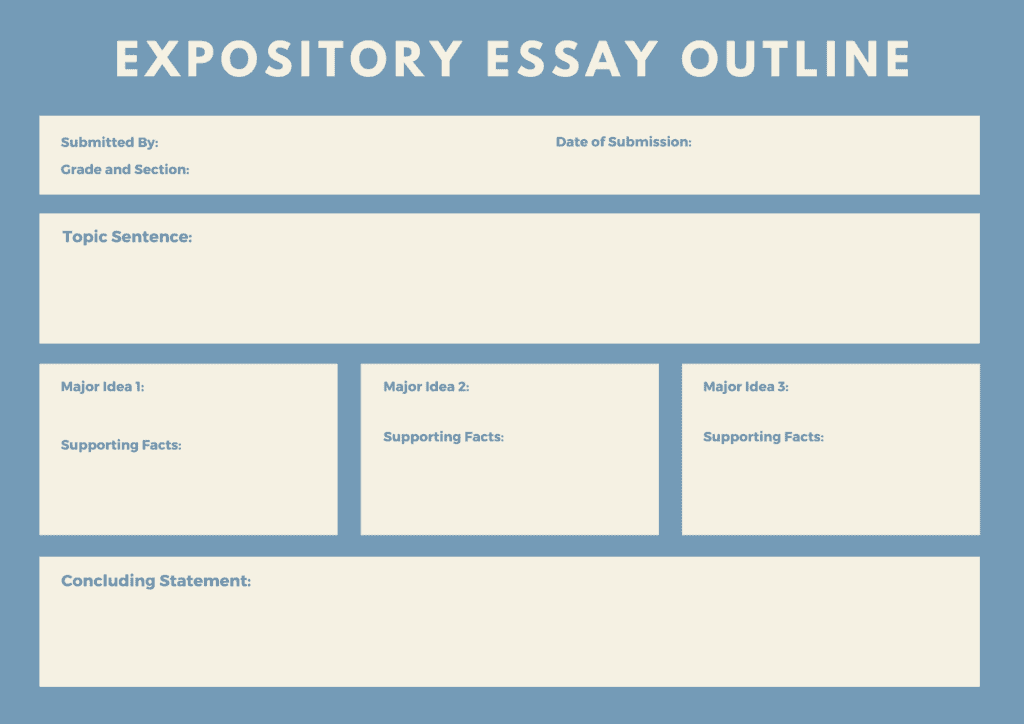
Expository writing is usually not the place for flowery flourishes of figurative imagery! Students should be encouraged to select a straightforward language that is easy for the reader to understand. After all, the aim here is to inform and explain, and this is best achieved with explicit language.
As we’ve seen, several variations of the expository essay exist, but the following are the most common features students must include.
The title should be functional. It should instantly inform the reader what they will learn about in the text. This is not the place for opaque poetry!
A table of contents in long essays will help the reader locate helpful information quickly. Usually, the page numbers found here will be linked to headings and subheadings to be found in the text.
HEADINGS / SUBHEADINGS:
These assist the reader in finding information by summarizing the content in their wording.
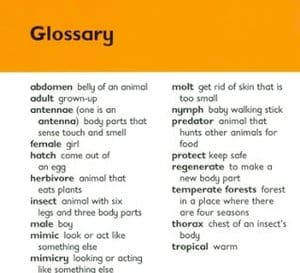
Usually listed alphabetically, the glossary defines unusual or topic-specific vocabulary and is sometimes accompanied by pictures, illustrations etc.
The index lets the reader identify where to find specific information in longer texts. An index is much more detailed than a table of contents.
VISUAL FORMS OF INFORMATION
Expository essays sometimes support the text with visuals, such as:
- Pictures / Illustrations / Photographs:
These can be used to present a central idea or concept within the text and are often accompanied by a caption explaining what the image shows. Photographs can offer a broad overview or a close-up of essential details.

Diagrams are a great way to convey complex information quickly. They should be labelled clearly to ensure the reader knows what they are looking at.
- Charts and Graphs:
These are extremely useful for showing data and statistics in an easy-to-read manner. They should be labelled clearly and correspond to the information in the nearby text.
Maps may be used to explain where something is or was located.
THE ULTIMATE NONFICTION WRITING TEACHING RESOURCE

- 270 pages of the most effective teaching strategies
- 50+ digital tools ready right out of the box
- 75 editable resources for student differentiation
- Loads of tricks and tips to add to your teaching tool bag
- All explanations are reinforced with concrete examples.
- Links to high-quality video tutorials
- Clear objectives easy to match to the demands of your curriculum
Types of expository essay
There are many different types of expository texts (e.g. encyclopaedias, travel guides, information reports , etc.), but there are also various expository essays, with the most common being.
- Process Essays
- Cause and Effect Essays
- Problem and Solution Essays
- Compare and Contrast Essays
- Definition Essays
- Classification Essays
We will examine each of these in greater detail in the remainder of this article, as they have slight nuances and differences that make them unique. The graphic below explains the general structure for all text types from the expository writing family.
THE PROCESS ESSAY
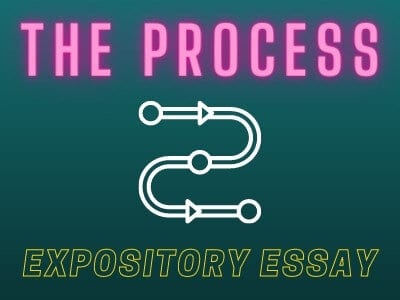
This how-to essay often takes the form of a set of instructions. Also known as a procedural text , the process essay has very specific features that guide the reader on how to do or make something.
To learn more about this type of writing, check out our information-packed article here .
Features of a process essay
Some of the main features of the process essay include:
- ‘How to’ title
- Numbered or bullet points
- Time connectives
- Imperatives (bossy words)
- List of resources
Example Expository Process Essay:
The cause and effect essay.
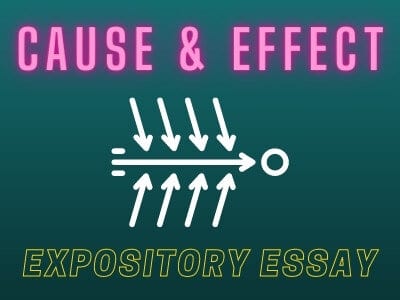
The purpose of a cause-and-effect essay is to explore the causal relationships between things. Essays like this often bring the focus back to a single cause. These essays frequently have a historical focus.
The text should focus on facts rather than assumptions as an expository essay. However, cause-and-effect essays sometimes explore hypothetical situations too.
There are two main ways to structure a cause-and-effect essay.
The Block Structure presents all the causes first. The writer then focuses on the effects of these causes in the second half of the essay.
The Chain Structure presents each cause and then immediately follows with the effects it created.
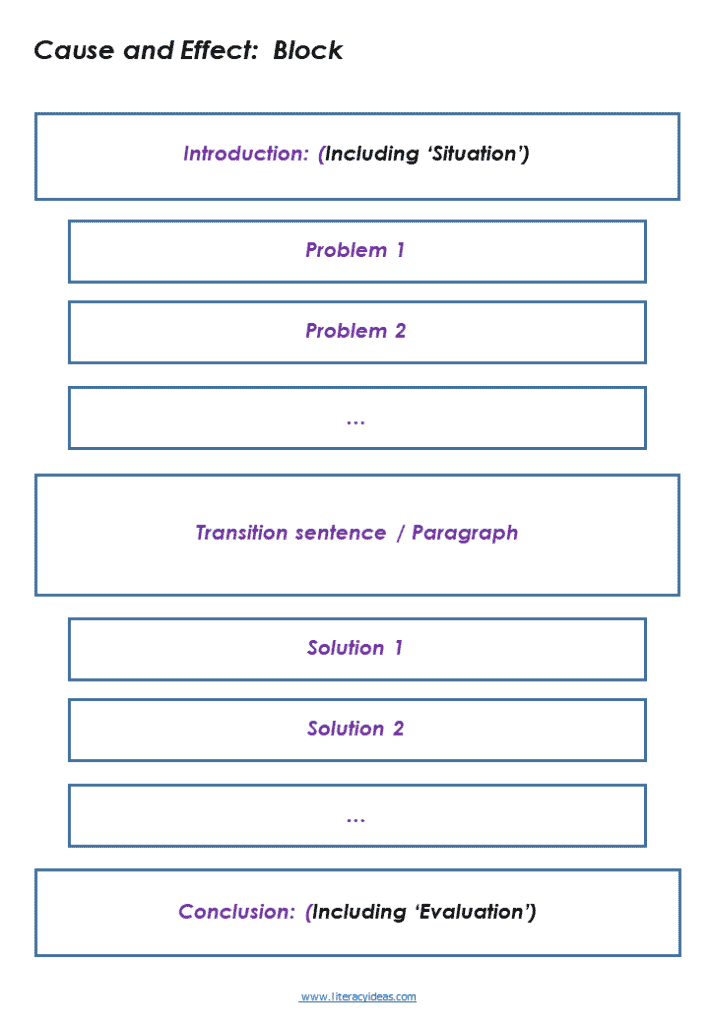
Example Expository Cause and Effect Essay:
The problem and solution essay.
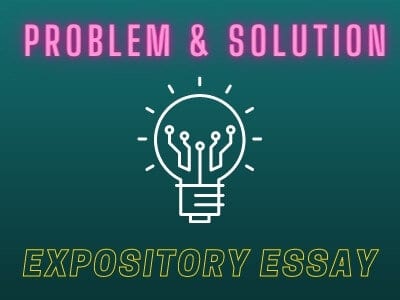
In this type of essay, the writer first identifies a problem and then explores the topic from various angles to ultimately propose a solution. It is similar to the cause-and-effect essay.
While the problem and solution essay can use the block and chain structures as outlined above – substitute cause with problem and effect with a solution – it will also usually work through the following elements:
- Identifies a problem
- Contains a clear thesis statement
- Each paragraph has a topic sentence
- Supports with facts, examples, evidence
- The conclusion summarizes the main points
Suggested Title: What Can Be Done to Prevent Bullying in Schools?
Example Expository Problem and Solution Essay:
The compare and contrast essay.

In this type of essay, students evaluate the similarities and differences between two or more things, ideas, people, etc. Usually, the subjects will belong to the same category.
The compare-and-contrast expository essay can be organized in several different ways. Three of these are outlined below.
In the three structures outlined, it is assumed that two subjects are being compared and contrasted. Of course, the precise number of paragraphs required in the text will depend on the number of points the student wishes to make and the number of subjects being compared and contrasted.
Suggested Title: In-Class or Remote Learning: Which Is Best?

DEFINITION ESSAYS
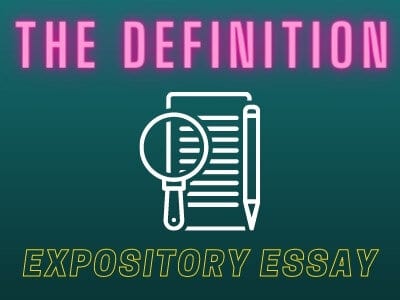
This type of essay provides a detailed description and definition of a word or phrase. It can be a concrete term, such as car or glass, or a more abstract concept, such as love or fear .
A definition essay comprehensively explains a term’s purpose and meaning. It will frequently contain some or all of the following elements:
- A definition of the term
- An analysis of its meaning
- The etymology of the term
- A comparison to related terms
- Examples to illustrate the meaning
- A summary of the main points
Example Expository Definition Essay:
CLASSIFICATION ESSAYS
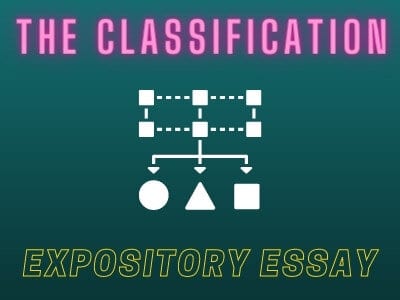
Like definition essays, a classification essay sorts or organizes things into various groups or categories and explains each group or category in detail.
Classification essays focus on:
- Sorting things into functional categories
- Ensuring each category follows a common organizing principle
- Provides examples that illustrate each category.
Example Expository Classification Essay:

One of the best ways to understand the different features of expository essays is to see them in action. The sample essay below is a definition essay but shares many features with other expository essays.

EXPOSITORY WRITING PROMPTS

Examples of Expository Essay Titles
Expository essay prompts are usually pretty easy to spot.
They typically contain keywords that ask the student to explain something, such as “define,” “outline,” “describe,” or, most directly of all, “explain.”
This article will examine the purpose of an expository essay and its structure. It will also examine the primary language and stylistic features of this vital text type.
After this, we’ll explore five distinct tips for helping your students get the most out of writing their expository essays.
Expository Essays vs Argumentative Essays
Expository essays are often confused with their close cousin, the argumentative essay. Still, it’s easy to help students distinguish between the two by quickly examining their similarities and differences.
In an expository essay, students will attempt to write about a thing or a concept neutrally and objectively, unlike an argumentative essay where the writer’s opinions permeate the text throughout. Simple as it sounds, this may take some doing for some students as it requires the writer to refine their personal voice almost out of existence!
Luckily, choosing the correct viewpoint from which to write the essay can go a long way to helping students achieve the desired objectivity. Generally, students should write their expository essays from the third-person perspective.
Contrastingly, argumentative essays are subjective in nature and will usually be written from the first-person perspective as a result.
In an expository essay, the text’s prime focus is the topic rather than the writer’s feelings on that topic. For the writer, disassociating their personal feelings on a topic is much easier when they’re a step removed from the narration by using the third-person POV rather than the first-person POV.
Expository Essay Tips
Follow these top tips from the experts to craft an amazing expository essay.

Tip #1: Choose the Right Tool for the Job

Surprising as it may seem, not all expository essays are created equal.
In fact, there are several different types of expository essays, and our students must learn to recognize each and choose the correct one for their specific needs when producing their own expository essays.
To do this, students will need to know the 5 types of expository essays:
- The Cause and Effect Essay : This type of essay requires that the writer explain why something happened and what occurred due to that event and subsequent events. It explores the relationship between people, ideas, events, or things and other people, ideas, events, or things.
- The Compare and Contrast Essay: In a compare and contrast essay, the writer examines the similarities and differences between two subjects or ideas throughout the body of the piece and usually brings things together in an analysis at the end .
- The Descriptive Essay: This is a very straightforward expository essay with a detailed description or explanation of a topic. The topic may be an event, place, person, object, or experience. This essay’s direct style is balanced with the freedom of the writer can inject some of their creativity into the description.
- The Problem and Solution Essay : In this expository essay, the student will work to find valid solutions to a specific problem or problem.
- The Process Essay : Also called a how-to essay, this essay type is similar to instruction writing, except in essay form. It provides a step-by-step procedure breakdown to teach the reader how to do something.
When choosing a specific topic to write about, students should consider several factors:
● Do they know the topic well enough to explain the ins and outs of the subject to an unfamiliar audience?
● Do they have enough interest in this topic to sustain thorough research and writing about it?
● Is enough relevant information and credible sources available to fuel the student’s writing on this topic?
Tip # 2: Research the Topic Thoroughly
Regardless of which type of expository essay your students are working on, they must approach the research stage of the writing process with diligence and focus. The more thorough they are at the research stage, the smoother the remainder of the writing process will be.
A common problem for students while researching is that sometimes they don’t have a clear understanding of the objective of their research. They lack a clear focus on their efforts.
Research is not mindlessly scanning documents and scrawling occasional notes. As with any part of the writing process, it begins with determining clear objectives.
Often, students will start the research process with a broad focus, and as they continue researching, they will naturally narrow their focus as they learn more about the topic.
Take the time to help students understand that writing isn’t only about expressing what we think; it’s also about discovering what we think.
When researching, students should direct their efforts to the following:

- Gather Supporting Evidence : The research process is not only for uncovering the points to be made within the essay but also the evidence to support those points. The aim here is to provide an objective description or analysis of the topic; therefore, the student will need to gather relevant supporting evidence, such as facts and statistics, to bolster their writing. Usually, each paragraph will open with a topic sentence, and subsequent sentences in the paragraph will focus on providing a factual, statistical, and logical analysis of the paragraph’s main point.
- Cite Sources : It’s an essential academic skill to be able to cite sources accurately. There are several accepted methods of doing this, and you must choose a citation style appropriate to your student’s age, abilities, and context. However, whatever style you choose, students should get used to citing any sources they use in their essays, either in the form of embedded quotations, endnotes, or bibliography – or all three!
- Use Credible Sources: The Internet has profoundly impacted knowledge sharing as the Gutenberg Press did almost 600 years ago. It has provided unparalleled access to the sum total of human knowledge as never before, with each student having a dizzying number of sources available at their fingertips. However, we must ensure our students understand that not all sources are created equal. Encourage students to seek credible sources in their research and filter out the more dubious sources. Some questions students can ask themselves to help determine a source’s credibility include:
● Have I searched thoroughly enough to find the most relevant sources for my topic?
● Has this source been published recently? Is it still relevant?
● Has the source been peer-reviewed? Have other sources confirmed this source?
● What is the publication’s reputation?
● Is the author an expert in their field?
● Is the source fact-based or opinion-based?
Tip #3: Sketch an Outline
Every kid knows you can’t find the pirate treasure without a map, which is true of essay writing. Using their knowledge of the essay’s structure, students start whipping their research notes into shape by creating an outline for their essay.
The 5-paragraph essay or ‘Hamburger’ essay provides a perfect template for this.
Students start by mapping out an appealing introduction built around the main idea of their essay. Then, from their mound of research, they’ll extract their most vital ideas to assign to the various body paragraphs of their text.
Finally, they’ll sketch out their conclusion, summarize their essay’s main points, and, where appropriate, make their final statement on the topic.
Tip #4: Write a Draft
Title chosen? Check! Topic researched? Check! Outline sketched? Check!
Well, then, it’s time for the student to begin writing in earnest by completing the first draft of their essay.
They’ll already have a clear idea of the shape their essay will take from their research and outlining processes, but ensure your students allow themselves some leeway to adapt as the writing process throws up new ideas and problems.
That said, students will find it helpful to refer back to their thesis statement and outline to help ensure they stay on track as they work their way through the writing process towards their conclusions.
As students work through their drafts, encourage them to use transition words and phrases to help them move smoothly through the different sections of their essays.
Sometimes, students work directly from an outline as if on a checklist. This can sometimes be seen as the finished essay resembling Frankenstein. That is an incongruous series of disparate body parts crudely stitched together.
Learning to use transitions effectively will help students create an essay that is all of a whole, with all the joins and seams sanded and smoothed from view.
Tip #5: Edit with a Fresh Pair of Eyes

Once the draft is complete, students enter the final crucial editing stage.
But, not so hasty! Students must pencil in some time to let their drafts ‘rest’. If the editing process occurs immediately after the student finishes writing their draft, they’ll likely overlook much.
Editing is best done when students have time to gain a fresh perspective on their work. Ideally, this means leaving the essay overnight or over a few nights. However, practically, this isn’t always possible. Usually, though, it will be possible for students to put aside their writing for a few hours.
With the perspective that only time gives, when returning to their work, students can identify areas for improvement that they may have missed. Some important areas for students to look at in the editing process include:
- Bias : Students need to remember the purpose of this essay is to present a balanced and objective description of the topic. They need to ensure they haven’t let their own personal bias slip through during the writing process – an all too easy thing to do!
- Clarity : Clarity is as much a function of structure as language. Students must ensure their paragraphs are well organized and express their ideas clearly. Where necessary, some restructuring and rewriting may be required.
- Proofread: With stylistic and structural matters taken care of, it’s now time for the student to shift their focus onto matters of spelling , vocabulary choice, grammar, and punctuation. This final proofread represents the last run-through of the editing process. It’s the students’ final chance to catch mistakes and errors that may bias the assessor (aka You! ) against the effectiveness of the piece of writing. Where the text has been word-processed, the student can enlist inbuilt spelling and grammar checkers to help. Still, they should also take the time to go through each line word by word. Automatic checkers are a helpful tool, but they are a long way from infallible, and the final judgement on a text should employ the writer’s own judgement.
Expository essays are relatively straightforward pieces of writing. By following the guidelines mentioned above and practising them regularly, students can learn to produce well-written expository essays quickly and competently.
Explaining and describing events and processes objectively and clearly is a useful skill that students can add to their repertoire. Although it may seem challenging at first, with practice, it will become natural.
To write a good expository essay, students need a good understanding of its basic features and a firm grasp of the hamburger essay structure. As with any writing genre, prewriting is essential, particularly for expository writing.
Since expository writing is designed primarily to inform the reader, sound research and note-taking are essential for students to produce a well-written text. Developing these critical skills is an excellent opportunity for students through expository writing, which will be helpful to them as they continue their education.
Redrafting and editing are also crucial for producing a well-written expository essay. Students should double-check facts and statistics, and the language should be edited tightly for concision.
And, while grading their efforts, we might even learn a thing or two ourselves!

⭐⭐⭐⭐⭐ (92 Reviews)
ARTICLES RELATED TO EXPOSITORY ESSAY WRITING

How to Start an Essay with Strong Hooks and Leads

How to write a perfect 5 Paragraph Essay

Top 5 Essay Writing Tips

Top Research strategies for Students
Essay Papers Writing Online
A comprehensive guide to crafting a well-written expository essay.

Expository essays are a common assignment in academic settings, requiring students to investigate an idea, evaluate evidence, and present a coherent argument. Crafting a stellar expository essay involves careful planning, research, and clear writing. Here are some essential tips to help you excel in your expository writing:
1. Choose a compelling topic: Select a topic that interests you and has enough relevant information to support your argument. Avoid broad topics and narrow down your focus to a specific aspect of the subject.
2. Conduct thorough research: Gather credible sources and evidence to back up your claims. Take notes, highlight key points, and organize your research to ensure a logical flow in your essay.
3. Develop a strong thesis statement: Your thesis should clearly state the main argument of your essay and provide a roadmap for the reader. Make sure it is specific, debatable, and supported by evidence.
Effective Strategies for Writing
Writing an expository essay requires careful planning and organization. Here are some effective strategies to help you craft a stellar essay:
- Start by brainstorming ideas and creating an outline. This will help you structure your essay and ensure that you cover all the necessary points.
- Use clear and concise language. Avoid using overly complex words or phrases that may confuse your readers.
- Provide ample evidence to support your arguments. Use reliable sources and cite them properly to back up your claims.
- Make sure to follow the proper essay format, including an introduction, body paragraphs, and a conclusion.
- Edit and proofread your essay carefully to eliminate any errors in grammar, punctuation, or spelling.
By following these strategies, you can create a compelling and well-structured expository essay that will impress your readers.
Analyze the Prompt Thoroughly
Before diving into writing your expository essay, it’s crucial to thoroughly analyze the prompt given. Take the time to understand the requirements and expectations outlined in the prompt. Pay attention to key words and phrases that indicate the specific focus of the essay, such as “explain,” “analyze,” “compare,” or “contrast.”
Make sure to identify any guidelines regarding the structure, length, and formatting of the essay. Understanding the prompt will help you tailor your writing to meet the specific criteria and ensure that your essay addresses the topic effectively.
Create an outline or plan based on the prompt to organize your thoughts and approach. This will guide you through the writing process and help you stay on track while developing a well-structured and coherent essay.
Develop a Clear Thesis Statement

A strong expository essay starts with a clear and concise thesis statement. Your thesis statement should clearly state the main argument or point you will be discussing throughout the essay. It acts as a roadmap for your readers, guiding them on what to expect and informing them about the main focus of your essay.
When developing your thesis statement, make sure it is specific, debatable, and focused. Avoid broad statements that lack clarity or detail. Instead, choose a narrow topic and make a claim that can be supported with evidence and analysis. Your thesis statement should be the foundation of your essay, so take the time to craft a well-structured and compelling statement that sets the tone for the rest of your writing.

Organize Your Ideas logically
When crafting an expository essay, it is crucial to organize your ideas in a logical and structured manner. Start by outlining your main points and subpoints to create a clear roadmap for your readers. Use transitions to smoothly guide your audience from one idea to the next, ensuring a coherent flow of information.
Consider using a traditional structure such as the five-paragraph essay format, with an introduction, body paragraphs, and a conclusion. This format helps you maintain a clear and organized presentation of your ideas, making it easier for readers to follow your argument and understand your points.
Use Proper Evidence and Examples
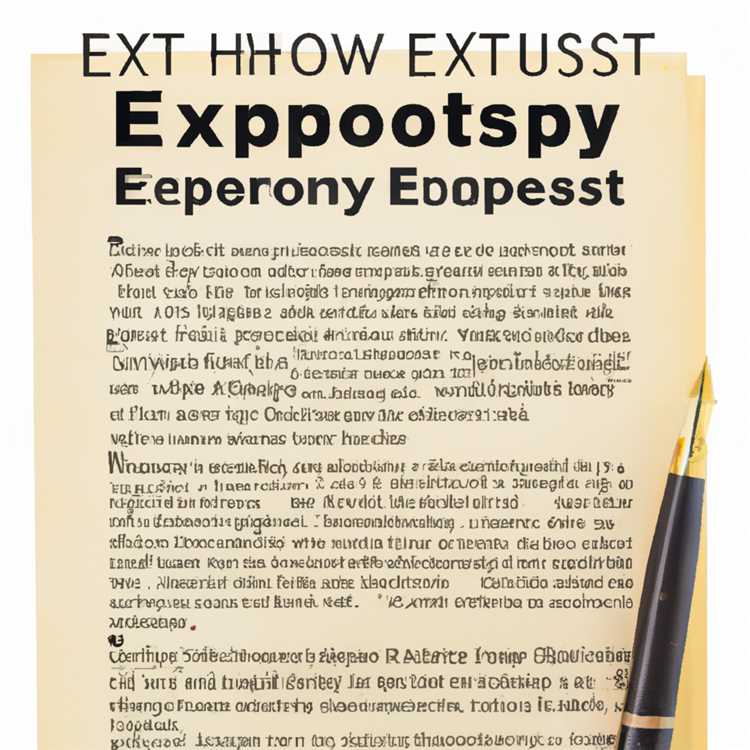
One of the key elements of a stellar expository essay is the use of proper evidence and examples to support your ideas. Ensure that the evidence you choose is relevant, reliable, and directly connects to the topic you are discussing. This will help strengthen your arguments and provide credibility to your essay.
When including examples in your essay, make sure they are clear, concise, and effectively illustrate your point. Avoid using vague or generic examples that do not add value to your argument. Instead, opt for specific examples that are insightful and help the reader understand the concepts you are presenting.
Remember to cite your sources properly when including evidence in your essay. This adds credibility to your work and shows that you have conducted thorough research to support your claims. By using proper evidence and examples, you can craft a compelling and well-supported expository essay that engages your audience and effectively conveys your message.
Revise and Edit Your Essay
Once you have completed your expository essay, it’s crucial to go back and revise it to ensure clarity and coherence. Here are some tips for effectively revising and editing your work:
- Read through your essay slowly and carefully to catch any grammatical or spelling errors.
- Check the flow of your ideas and make sure they are logically organized.
- Look for any repetitive or redundant sentences and remove them to improve conciseness.
- Ensure that your thesis statement is clear and is well-supported throughout your essay.
- Consider the overall structure of your essay and make sure each paragraph flows smoothly into the next.
After revising, it’s also important to edit your essay for style, tone, and word choice. Make sure your writing is clear, concise, and engaging for your readers. Consider seeking feedback from a peer or instructor to get a fresh perspective on your work. By thoroughly revising and editing your expository essay, you can ensure that it is polished and ready for submission.
Related Post
How to master the art of writing expository essays and captivate your audience, convenient and reliable source to purchase college essays online, step-by-step guide to crafting a powerful literary analysis essay, unlock success with a comprehensive business research paper example guide, unlock your writing potential with writers college – transform your passion into profession, “unlocking the secrets of academic success – navigating the world of research papers in college”, master the art of sociological expression – elevate your writing skills in sociology.
How to Write an Expository Essay: Definition, Outline, Writing Tips, and Examples

In the realm of academic writing, this type of essay stands as a beacon of clarity, demanding writers to illuminate a subject with precision and objectivity. Whether you're a seasoned essayist or a student embarking on your first exploration of this genre, mastering the art of expository writing is a valuable skill that transcends disciplines. This form of essay invites you to delve into expository essay topics, dissect their intricacies, and present your findings in a straightforward manner.
In this comprehensive guide, we will explore the terrain of expository writing, unraveling the techniques and strategies that transform a mere composition into a beacon of insight. From understanding the fundamental principles to honing your ability to craft a compelling thesis, join us on a journey that promises to demystify the process of writing, empowering you to articulate ideas with clarity and purpose. Or, you can get our essay writing help and take care of other important tasks set for today.
What Is an Expository Essay
An expository essay is a form of academic writing that aims to elucidate, clarify, and present a balanced analysis of a particular topic or idea. Unlike other essay types that may delve into personal opinions or narratives, the expository essay emphasizes objectivity and factual accuracy. The primary objective is to provide a clear and comprehensive explanation of the chosen subject, exploring its various facets, presenting evidence, and ensuring a logical progression of ideas.
.webp)
According to an expository essay definition, this genre requires the writer to delve into research, organize information systematically, and deliver a coherent and informative piece that educates the reader on the chosen topic. Whether investigating a scientific concept, historical event, or literary work, it serves as a vehicle for conveying knowledge in a concise, lucid manner.
Expository Essay Examples
An expository essay example serves as a valuable tool for students, offering a concrete illustration of the structure, style, and depth expected in this genre of writing. By studying examples, students gain insights into effective thesis formulation, organizing ideas within paragraphs, and integrating supporting evidence to bolster arguments.
Additionally, examples showcase how to balance factual accuracy and engaging prose, providing a model for clear and concise communication. Students can draw inspiration from the content and presentation of well-crafted expository essays, honing their own skills in research, analysis, and effective expression. By the way, we have an interesting autobiography example , so check it out!
Example 1: “The Evolution of Artificial Intelligence”
This expository essay explores the multifaceted evolution of artificial intelligence (AI), examining its historical roots, contemporary applications across various industries, and the consequential societal impact. It provides a comprehensive overview of AI's journey from philosophical debates and early computational developments to its current role as a transformative force in healthcare, finance, manufacturing, and entertainment. Additionally, the essay addresses ethical considerations surrounding the widespread adoption of AI, including concerns related to job displacement, privacy, and responsible development. Ultimately, it navigates the complex landscape of artificial intelligence, shedding light on its remarkable advancements and its challenges to our ever-changing society.
Example 2: “The Benefits of Outdoor Education for Children”
This essay highlights the advantages of outdoor education for children, emphasizing its positive impacts on their physical, mental, and social development. It argues that outdoor activities like hiking, camping, and team sports not only promote physical health by encouraging movement and reducing sedentary behavior but also contribute to mental well-being by providing a respite from everyday stressors and fostering a connection with nature. Furthermore, it suggests that exposure to outdoor environments cultivates environmental awareness and a sense of stewardship among children.
Need some help with your homework?
Get help from our expository essay writing service ! Leave us a notice and we'll make your tasks asap.
Types of Expository Essay
Expository essays come in several distinct types, each serving a unique purpose and requiring specific approaches to convey information effectively. One common categorization includes:
- Descriptive Expository Essay. This type focuses on painting a vivid picture of a subject, using sensory details to engage the reader's imagination. It aims to create a clear and sensory-rich portrayal of a person, place, object, or experience.
- Process Expository Essay. Here, the writer breaks down a complex process or procedure into manageable steps, providing a detailed and sequential explanation. This type of essay is instructional, guiding readers through a series of actions to achieve a specific outcome.
- Comparison and Contrast Expository Essay. This form involves analyzing similarities and differences between two or more subjects, offering insights into their shared characteristics or divergent qualities. It requires a careful examination of the chosen elements to highlight their relationships.
- Cause and Effect Expository Essay. Focused on exploring the reasons behind an occurrence and its subsequent consequences, this type delves into the cause-and-effect relationships within a given topic. Writers elucidate the connections between actions and outcomes, fostering a deeper understanding of the subject matter.
- Problem and Solution Expository Essay. Addressing real-world issues, this essay type identifies a specific problem, analyzes its root causes, and proposes viable solutions. It encourages critical thinking and problem-solving skills, compelling readers to consider alternative approaches to challenges.
- Definition Expository Essay. This essay seeks to clarify and explain the meaning of a particular term, concept, or idea. Writers provide a comprehensive definition, often including examples and illustrations to ensure readers grasp the essence of the subject.
- Cause and Effect Expository Essay. This type of essay examines the reasons behind a particular phenomenon or event and explores its subsequent effects. It aims to establish a clear cause-and-effect relationship, allowing readers to comprehend the interconnected elements of the topic.
Understanding these diverse types of essays empowers writers to choose the most suitable approach for effectively conveying information and achieving their communicative goals. Our experts can rewrite essay that you already did according to any of the above-mentioned types.
Expository Essay Topics
Selecting compelling expository essay topics requires thoughtful consideration of both personal interest and the potential engagement of the intended audience. Start by identifying subjects that genuinely captivate your curiosity or align with your expertise, as this enthusiasm will naturally infuse vigor into your writing. Additionally, assess the topic's relevance in the broader context, ensuring it addresses contemporary issues or timeless themes.
Consider the audience's interests, aiming for subjects that resonate with their experiences or evoke a sense of shared relevance. Striking a balance between uniqueness and accessibility is key—opt for topics that allow you to offer fresh perspectives while ensuring there is ample research material available. Ultimately, the best topics seamlessly blend your passion, the audience's interests, and the broader significance of the chosen subject, ensuring a captivating and informative exploration for both writer and reader alike. Here are expository essay ideas from our writers for your inspiration:
.webp)
- The influence of art on human emotions.
- Exploring the life cycle of a star.
- Tips for sustainable living in urban areas.
- The impact of social media on political awareness.
- How to cultivate a positive mindset in challenging times.
- The history and cultural significance of tattoos.
- The process of recycling electronic waste.
- Benefits of incorporating meditation into daily routines.
- The role of laughter in maintaining mental health.
- Understanding the psychology of decision-making.
- The impact of fashion on individual expression.
- Tips for effective conflict resolution in relationships.
- The science behind the sense of taste.
- The significance of biodiversity in ecosystems.
- Exploring the history of traditional folk music.
- How to foster a sense of community in a neighborhood.
- The benefits of learning a musical instrument.
- The evolution of communication technologies.
- The process of seed germination in plants.
- Tips for creating a productive home office space.
- The impact of artificial intelligence on job markets.
- Understanding the concept of emotional intelligence.
- The benefits of practicing gratitude daily.
- The history and cultural importance of tea.
- How to develop effective public speaking skills.
- Exploring the world of virtual reality technology.
- The significance of water purification methods.
- Tips for maintaining a healthy work-life balance.
- The process of making sustainable food choices.
- The role of literature in shaping societal norms.
Expository Essay Outline
An outline for expository essay is a structured plan that serves as a roadmap for organizing the main ideas and supporting details of the essay in a logical and coherent manner. While the specific structure may vary based on the assignment or preferences, a typical outline generally includes the following components, beginning with how to start an expository essay:
.webp)
Expository Essay Introduction
- Hook or attention-grabbing statement.
- Background information on the topic.
- Clear thesis statement that presents the main idea.
Body Paragraphs (usually three or more)
- Topic sentence for each paragraph, presenting a main point or supporting idea.
- Supporting evidence, facts, or examples to illustrate and explain the topic sentence.
- Analysis or interpretation of the evidence to connect it back to the thesis.
Expository Essay Conclusion
- Restatement of the thesis in different words.
- Summary of the main points discussed in the body paragraphs.
- Concluding thoughts or insights, possibly suggesting implications or future considerations.
Transitions
- Smooth transitions between paragraphs to ensure a cohesive flow of ideas.
- Clear connections between sentences and paragraphs to guide the reader through the essay.
Revising and Editing
- Space for notes on areas that may need revision or improvement.
- Consideration of clarity, coherence, and overall effectiveness.
By creating an expository essay outline, a college essay writer can organize their thoughts, ensure a logical progression of ideas, and maintain a clear and concise structure. This framework helps writers stay focused on the main purpose of the essay – to inform, explain, or analyze a particular subject – while providing a roadmap for readers to follow and comprehend the information presented.
How to Write an Expository Essay Step by Step
Writing an expository essay involves a systematic process that ensures clarity, coherence, and effectiveness in conveying information. Here is a step-by-step guide to help you craft an expository essay:
Choose a Topic
- Select a topic that interests you and aligns with the purpose of an expository essay – to inform, explain, or analyze a subject.
Conduct Research
- Gather relevant and credible information to support your chosen topic.
- Utilize reputable sources such as academic journals, books, and reliable websites.
Create an Outline
- Develop a clear and organized outline that includes the introduction, body paragraphs, and conclusion.
- Each section should have a specific purpose and contribute to the overall coherence of the essay.
Write the Introduction
- Start with an attention-grabbing hook that relates to your topic.
- Provide background information and context, leading to a concise and focused thesis statement that outlines the main idea.
Develop Body Paragraphs
- Each body paragraph should begin with a clear topic sentence that introduces the main point.
- Support the topic sentence with evidence, facts, or examples.
- Ensure a logical flow between paragraphs, using transitions to guide the reader.
Provide Evidence
- Support your points with credible evidence and examples.
- Ensure that each piece of evidence directly relates to the topic sentence and supports the overall thesis of the essay.
Analyze and Interpret
- After presenting evidence, analyze and interpret it.
- Explain the significance of the evidence and how it relates to your thesis.
- This step helps to ensure that your audience understands the relevance of the information presented.
Write the Conclusion
- Summarize the main points discussed in the body paragraphs without introducing new information.
- Restate the thesis in different words and offer concluding insights or implications related to the topic.
Revise and Edit
- Review your essay for clarity, coherence, and consistency.
- Check for grammatical errors and awkward phrasing, ensuring a smooth flow of ideas.
- Consider feedback from others or take a break before revising to gain a fresh perspective.
- Carefully proofread your essay to catch any remaining errors, typos, or issues.
- Pay attention to grammar and punctuation.
By following these steps, you can systematically approach the writing process and create a well-organized and informative expository essay. Remember to stay focused on the purpose of informing, explaining, or analyzing the chosen topic throughout the entire writing process.
Final Thoughts
Learning how to write an expository essay offers students several important advantages. First off, it helps them express their thoughts clearly and organize ideas effectively, skills that are useful not only in academics but also in various professional situations where clear communication is key.
Moreover, writing expository essays improves critical thinking as students practice analyzing information, connecting ideas, and presenting well-supported arguments. This skill is valuable in everyday decision-making and problem-solving scenarios.
Additionally, the process of crafting such essays enhances research abilities, teaching students how to find, evaluate, and use information effectively. Overall, mastering expository writing equips students with practical, transferable skills that can positively impact their academic and professional pursuits. You can use our research paper service to cope with assignments better and faster.
Want to Ace Your Expository Writing?
Your wish is our command - order now and experience the excellence of our expert writers!
What are the Different Types of Expository Essays?
What is the most important part of the expository essay structure, what is the main idea in expository writing.

Daniel Parker
is a seasoned educational writer focusing on scholarship guidance, research papers, and various forms of academic essays including reflective and narrative essays. His expertise also extends to detailed case studies. A scholar with a background in English Literature and Education, Daniel’s work on EssayPro blog aims to support students in achieving academic excellence and securing scholarships. His hobbies include reading classic literature and participating in academic forums.

is an expert in nursing and healthcare, with a strong background in history, law, and literature. Holding advanced degrees in nursing and public health, his analytical approach and comprehensive knowledge help students navigate complex topics. On EssayPro blog, Adam provides insightful articles on everything from historical analysis to the intricacies of healthcare policies. In his downtime, he enjoys historical documentaries and volunteering at local clinics.
Related Articles
.webp)

The Admissions Strategist
Expository writing: how to write an incredible expository essay.
Expository essays are frequently assigned in English classes and are evaluated in various standardized exams.
But what exactly is an expository essay, and how do you write a good one?
In this article, we’ll tell you everything you need to know to pen a high-scoring expository paper.
What Is an Expository Essay?
The word expository means “intended to explain or describe something.”
An expository essay requires you to investigate an idea, gather supporting evidence, and present your point of view on a topic.
- You may be wondering how this differs from a persuasive essay.
- While both essay types require you to provide evidence to support a claim, persuasive essays are more argumentative.
A persuasive essay includes a counterargument, which addresses and rebuts an opposing viewpoint.
Expository essays, on the other hand, focus on clearly explaining and supporting your point of view.
Parts of an Expository Essay
A strong expository essay should consist of:
- An introductory paragraph with a clear thesis
- Evidence that supports the thesis (typically in three body paragraphs)
- A conclusion
Below, we’ll look at how to construct the expository essay piece by piece.
For clarity, we’ll focus on a somewhat formulaic process for expository writing.
Once you’ve mastered these basics, you can take risks and sprinkle more creativity throughout your essays.
Introduction
The introduction frames the topic of your essay.
It also provides readers with any necessary background information or context.
A simple format for your introduction is:
- Grabber/Hook – A compelling sentence or two that draws readers into your essay.
- Background Information (as needed) – Any basic information the reader needs to know about the topic to understand your essay.
- Thesis Statement – This is the most important sentence of your entire essay. See below for more information.
Thesis Statement
The thesis statement is the roadmap for your entire essay, so it must be clear and concise. It should state your point of view on the topic.
- The thesis may also briefly mention the supporting evidence you’ll expand on in the body of the essay.
For instance, a thesis statement might say:
Students should read more literature because it improves vocabulary, reading comprehension, and empathy.
The writer’s viewpoint is immediately clear: Students should read more literature.
The writer also indicates that her supporting evidence will mention several benefits of reading literature: improved vocabulary, better reading comprehension, and increased empathy.
- Most likely, each of these points will form one of the writer’s body paragraphs.
If your teacher (or a standardized test) assigns you a topic, here’s another way to think of a thesis statement: The thesis is your answer to the question being asked.
- Let’s say you receive a prompt that says, “Your community is thinking of starting a program encouraging people to limit car usage. Explain how limiting car usage would benefit your community.”
This prompt is essentially asking, “How would limiting car usage benefit your community ?”
- Thus, your thesis could answer the question by saying something like, “Limiting car usage would benefit the community because it would decrease traffic, improve public health, and reduce air pollution.”
This approach ensures that you’re on topic and directly addressing the prompt.
Supporting Evidence
Once you’ve clearly stated your point of view, it’s time to support it. To do this, you’ll need evidence . Sometimes, this will mean doing your own research.
On other occasions, especially exams, you’ll be provided with relevant resources.
These may include newspaper articles, primary sources, photos, or even audio recordings.
- Your job is to sort through these resources and find evidence that supports your thesis. It’s important to note that if you can’t find evidence supporting your thesis, you’ll need to change it.
Strong evidence may include research findings, quotes from experts, and statistics. Make sure that your evidence is from credible sources and clearly supports your thesis statement.
Organizing Evidence
After finding your supporting evidence, you’ll organize it into body paragraphs, typically three of them.
Each body paragraph should focus on one general idea.
In addition, each of these general ideas should be logically connected to your thesis statement.
- Your body paragraphs should start with a topic sentence that introduces the idea that the body paragraph will elaborate upon.
Remember our sample thesis about students reading more literature?
- The topic sentence of the first body paragraph could read, “To start with, reading literature is essential because it expands students’ vocabulary.”
After the topic sentence, the paragraph should introduce 2-3 pieces of evidence supporting this idea.
If a piece of evidence doesn’t clearly relate to the body paragraph’s topic sentence, it needs to be moved or deleted.
Analyzing Evidence
When you introduce a piece of evidence, follow it up with a sentence analyzing the evidence in your own words.
- Explain the connection between the evidence and your thesis statement.
- How does it support your point of view?
- How do you interpret this evidence?
Remember that essays don’t only reflect your writing skills; they also reflect your critical thinking skills.
Instead of merely quoting evidence, you must also explain your thought process.
As a result, an effective body paragraph can follow this formula:
- Topic sentence
- Evidence #1
- Analysis of Evidence #1
- Evidence #2
- Analysis of Evidence #2
- Evidence #3 (Optional)
- Analysis of Evidence #3 (Optional)
- Concluding/transitional sentence
The final sentence of the body paragraph should remind readers of the paragraph’s main point and connect it to the next paragraph.
Transitions are important because they help readers follow your train of thought without confusion.
They smoothly guide readers through your paper.
Transition words and phrases include:
- For example
- For instance
- To illustrate
- Specifically
- On the other hand
- Consequently
- As a result
- Additionally
- Furthermore
Get personalized advice!
Like stories, essays have a beginning, middle, and end.
- The introduction is your beginning, the body paragraphs form the middle, and the conclusion brings the paper to an end.
The conclusion synthesizes the information included in your essay.
As the name suggests, it also draws a conclusion from the information presented.
- Instead of simply restating the thesis, you should revisit the thesis in light of the supporting evidence you’ve provided. Do not introduce any new information in the conclusion.
Remember that the conclusion is your last chance to make an impression on the reader. It should be logical and convincing.
Try to end with a strong and/or memorable final sentence.
In total, an expository essay includes these pieces:
– Introduction
- Hook/grabber
- Background information
– Body paragraphs (usually three)
– conclusion.
- Synthesis of evidence
- Explanation of what this evidence shows (connected to thesis)
- Strong final sentence
If you include each of these pieces, you’ll have a clear, logical, and effective expository essay.
Once you become comfortable following this formula, you may wish to vary it or infuse it with your own style.
Just make sure that all the essential pieces are present in your essay.
The Expository Essay Writing Process
Before you can effectively assemble an expository essay, you’ll need to gather information and plan your approach.
Typically, the writing process includes:
- Carefully reading the prompt (if applicable)
- Brainstorming
- Gathering evidence
- Revising/editing
Let’s take a closer look at each step in the process.
1. Reading the Prompt
If you’re provided with a prompt, understanding it is an essential first step.
Misinterpreting the prompt will result in a low score, even if your essay is well-written.
- Read the prompt at least 2-3 times, underline key words and phrases. If the prompt is complicated, you may want to rewrite it in your own words.
Does the prompt have multiple parts? If so, make sure you understand each part and that your essay clearly addresses all of them.
2. Brainstorming
Once you’ve read the prompt, begin brainstorming how you will approach it.
- If you’ve been provided with relevant resources, this may also include a first read-through or skimming of these texts.
What position will you take? How are you planning to support your viewpoint? Jot down any idea that pops into your head.
- It doesn’t matter if the idea is good—right now, you’re just trying to find inspiration. You’ll change, add, or remove information later.
If you haven’t been provided with a prompt, you’ll need to brainstorm a topic that interests you.
It should also be a topic on which you’re at least somewhat knowledgeable.
3. Gathering Evidence
At this point, you’ll find evidence that supports your point of view.
- It helps to write at least a rough draft of your thesis statement before beginning this step.
- This way, you’ll have a clear idea of what sort of evidence you need to find.
After writing your thesis statement, find credible evidence that supports it.
- This may require you to go to the library or browse scholarly databases on the Internet.
Alternatively, you may have been provided with resources.
In that case, read through the resources carefully, underlining or circling evidence that reinforces your thesis.
4. Planning
Planning ensures that your essay is organized, focused, and cohesive.
It also allows you to catch potential mistakes before they happen.
- For instance, you might realize that some of your evidence doesn’t fit, or that one of your body paragraphs is lacking support.
You can then address these areas of weakness before writing your essay.
- At the top of your planning sheet (or a document on your computer) write your thesis statement.
- Continually reference the thesis to ensure that you’re focused and on topic.
- Next, determine the focus of each body paragraph and the 2-3 pieces of evidence that will support it.
Sometimes, students think that planning is too time-consuming.
However, a plan will save you time in the long run.
With all your quotes and evidence organized in one place, writing your essay is much faster and easier.
Once you have a completed plan, begin writing your essay.
- Remember to analyze each piece of evidence and clearly connect your points with transitions.
Use a formal, academic tone and avoid slang or overly casual language.
Vary your sentence structure, including both short and long sentences. Pay attention to spelling, grammar, and punctuation.
6. Revising
Students often skip the revising and editing step of the writing process.
This is a mistake. Slowly read through your essay at least once before submitting it.
- Look for misspelled words, incorrect verb tenses, and punctuation or grammar mistakes. Does your writing flow well? Does everything make sense?
- Are all of your points clear? Have you used the same word or phrase repetitively? (If you have, try to substitute a synonym.) Did you use transitions connecting your ideas?
Ensure that you submit the best, most polished version of your essay possible. Mistakes and unclear sentences make a poor impression.
Advice From the Experts:
From Dr. Carrie Brown, professor of English and creative writing at Sweet Briar College and novelist :
When I’m working with students on expository writing — on writing in any rhetorical mode, really — I remind them that almost inevitably they have to stumble their way through some lousy sentences before they discover what they actually want to say. (This takes us back to that famous question: How do I know what I mean until I see what I say?) Some messy writing usually precedes orderly, elegant writing, and every writer needs patience during that messy process, because that process is important: out of that process emerges clear thinking, which is the true key to clear writing. Once writers have waded around in the muck for a while, then they can step back and examine those sentences or numbered phrases or bulleted points — whatever method felt most natural to the writer by which to set down emerging thoughts — to discover which are relevant, which are simply repetitions of earlier thoughts, which are superfluous or meaningless, and in what order they ought to proceed. A trick that seems to work for students with a strong tendency toward auditory learning can actually record themselves speaking aloud, trying to address the topic, and then play back that recording, meanwhile transposing ideas — and usually improving and clarifying them — as they go.
From Adam Cole, author and writing expert:
Know your audience – Whatever you are writing, you will get the best results if you are thinking about who is reading it, why they are reading it, and what you should do to make sure the interaction between you and the reader is optimal. While the audience for an expository piece may be obvious, writing directly to that audience is not so obvious. It affords you an opportunity to think clearly and write clearly without having to worry about your identity, ego or success. If you are in school, the audience for expository writing is your professor, and you should be fulfilling the boxes in their rubric to the letter. If they haven’t given you a rubric, ask for one. If they won’t, find one or create one based on conversations with them, their former students, or another professor.
From Tangela Walker-Craft – Simply Necessary, Inc. , Family and Parenting Blogger:
Write in complete sentences. Write in paragraph form. Each paragraph should contain 3 to 5 sentences for short essay questions, and 5 to 10 sentences for long essay questions. Vary sentence length and structure; try not to begin sentences with the same word or words. Use facts and information taken from reading passages to answer questions; refer back to the reading passage to stay focused. Underline important information in reading passages to make it easier to go back to them when answering questions. Proofread. Proofreading sentences backwards makes finding spelling mistakes and punctuation errors easier because it forces test-takers to focus on individual words instead of automatically “seeing” what he or she intended to write.
From Peter Donahue, a writing expert and teacher:
1. Write for clarity, not formality. As a teacher, I see a lot of expository writing where the writer is more concerned with following the conventions of academic jargon than she is with expressing ideas. A good example is the use of “utilize” instead of “use,” because it “sounds more formal,” or the avoidance of the pronoun “I” because it “sounds too informal.” So, rather than trying to appear formal, expository writing should aim to be clear. George Orwell’s 1946 essay, “Politics and the English Language,” says more on this topic, and is a worthwhile read. 2. Think synthetically, write analytically. Synthetic thinking starts with small details, or an open-ended question. As thoughts continue to develop, the main idea is clarified (or discovered) at the end the process. Contrariwise, Analytical thinking starts with a “given:” a major premise or generalization. It then proceeds to break down the main idea into its components and deal with each separately. Expository writing is usually presented most effectively in an analytic format — the main idea first, the support afterwards. On the other hand, literary writing, like a poem or discursive essay, is often presented synthetically. The key is knowing the difference between thought process and written format. We can think something synthetically, and then write it analytically. And in fact, this process can be the key to effective expository writing for many people. Don’t assume that because a thesis appears in the first paragraph, you have to think of it first. You could try drafting it synthetically, to clarify your thinking. Then rewrite it analytically to present it more effectively for your reader.
From Jessica Moody, curriculum expert :
Expository writing is first about structure, second about clarity, and third about content. Depending on the type of expository writing there is a specific structure expected. Even in college essays each sentence on the essay has a purpose and can be labeled as a thesis statement, topic sentence, evidence, or explanation of evidence. If the structure is not there, most of the time there is not much clarity and the content is lacking because it is confusing. This is the same for any type of expository writing. My suggestion for people becoming better at expository writing is to study the structure of the piece, the paragraph structures and the sentence structures. If you understand how to break down the structure then you can learn to replicate any style or form you want.
Final Touches: Expository Essay Writing
Writing an excellent expository essay isn’t as complicated as it seems. Simply follow the steps and include the essential pieces outlined here.
Your essay is sure to showcase both your thinking and writing skills —and earn you a high score!
Learn how we can help you with college and career guidance! Check out our YouTube channel!
Click Here to Schedule a Free Consult!

Calm your anxiety by learning every aspect of the college application process and how to excel at navigating it.

- Ethics & Honesty
- Privacy Policy
- Join Our Team
(732) 339-3835

Get science-backed answers as you write with Paperpal's Research feature
What is an Expository Essay and How to Write It

You’ve been asked to write an expository essay on a particular topic. You know that an essay is generally a written composition that is usually limited in length and reflects the author’s perspective. However, the “expository” part is a little less clear. Keep reading, and you’ll get enough information to understand what an expository essay is and how to create an effective expository essay that meets the assignment requirements.
Table of Contents
What is an expository essay, what is the purpose of expository writing, when should you write an expository essay, 5 types of expository essays, how to structure an expository essay.
- How to write an expository essay with Paperpal
Key takeaways
Frequently asked questions about expository essays.
The expository essay is the appropriate type of essay to write if you need to inform your audience. If your intent is to critically compare, argue, or persuade, you will want to consider a different essay format. To explain it in more detail:
- An expository essay is a type of academic writing that aims to present a balanced and objective analysis of a specific topic.
- Expository essays often employ various techniques to enhance clarity and understanding. These techniques may include definition, comparison and contrast, cause and effect analysis, problem and solution exploration, or descriptive explanations. The writer should also ensure that the essay maintains a neutral and objective tone, avoiding personal biases or emotional language.
- In an expository essay, the writer typically starts with an introduction that presents the topic and provides an overview of what will be discussed in the essay. The body paragraphs then delve into the details, presenting evidence, examples, and relevant information to support the main points. Each paragraph should focus on a specific aspect or subtopic, and the information should be organized logically and coherently.
- Expository essays are commonly assigned in academic settings as they encourage critical thinking, research skills, and the ability to present information in a clear and concise manner.
- The ability to write an expository essay is an essential skill for students and professionals. It promotes critical thinking, objectivity, and clear and concise communication.

Writing an expository essay? Start strong with Paperpal’s Templates. Create the perfect outline in minutes!
The primary goal of expository writing is to explain or clarify a concept, process, or phenomenon using evidence, examples, and logical reasoning. Unlike persuasive or argumentative essays, the purpose of an expository essay is not to convince the reader of a particular viewpoint or opinion, but rather to provide clear and concise information.
The main objectives of expository writing are:
- Informing: Expository writing aims to educate and provide readers with new or valuable information. It seeks to convey facts, details, concepts, or ideas about a topic in a straightforward and concise manner.
- Explaining: Expository writing helps readers grasp complex subjects by breaking them down into simpler terms. It aims to clarify abstract concepts, processes, or phenomena, making them more accessible and understandable.
- Instructing: Expository writing provides step-by-step instructions or guidelines on how to perform a task, accomplish a goal, or understand a process. It offers a clear sequence of actions or explanations to ensure readers can follow and replicate the instructions.
- Presenting an analysis: Expository writing often involves analyzing and evaluating information, data, or evidence related to a particular subject. It may include comparing and contrasting different viewpoints, examining cause-and-effect relationships, or offering an objective evaluation of a situation.
Overall, the purpose of expository writing is to provide readers with accurate, unbiased, and well-organized information about a specific topic. It aims to enhance understanding, broaden knowledge, and facilitate learning by presenting information in a clear, coherent, and logical manner.
An expository essay is a good choice when the goal is to inform, explain, describe, or instruct. You may be assigned an expository essay as part of an in-class exam or coursework assignment. Here are some common situations in which writing an expository essay would be appropriate:
- Academic Assignments: Expository essays are frequently assigned in educational settings. Teachers often use this type of essay to assess students’ understanding of a particular subject or to teach them how to research and present information effectively. They are common in subjects such as English, history, science, social studies, or any discipline that requires a clear explanation or analysis of a topic.
- Instructional or How-to Writing: When you want to provide step-by-step instructions or guidance on how to perform a task, solve a problem, or achieve a specific outcome, an expository essay can be an appropriate format. This type of writing is commonly used in manuals, guidebooks, tutorials, or any instructional material.
- Journalism or News Writing: Expository writing is prevalent in journalism, where the goal is to inform readers about current events, news stories, or investigative reports. Journalists strive to present objective information, provide background details, and explain complex issues clearly to their audience.
- Professional or Technical Writing: In various professional fields, such as business, healthcare, engineering, or law, expository writing is utilized to convey information to colleagues, clients, or the general public. This includes writing reports, memos, manuals, research papers, or any form of communication that requires clear and factual presentation of information.

Looking to develop your expository essay? Build your ideas and enhance your writing with Paperpal Research!
Expository essays can serve different purposes and present information in various ways. Here are five common types of expository essays:
- Descriptive essay: This type of expository essay focuses on describing a person, place, object, event, or any subject in detail. It aims to create a vivid and sensory-rich portrayal of the topic, using language that appeals to the reader’s senses and emotions.
- Process essay: Also known as a “how-to” essay, a process essay explains a sequence of steps or procedures to accomplish a task or achieve a particular outcome. It provides clear instructions and guidance, breaking down complex processes into manageable and easy-to-follow stages.
- Compare-and-contrast essay: This type of expository essay explores the similarities and differences between two or more subjects. It involves examining various aspects, characteristics, or elements of the subjects and highlighting their similarities, differences, or both.
- Cause-and-effect essay: A cause-and-effect essay explores the reasons (causes) behind an event, situation, or phenomenon, as well as the consequences (effects) that result from it. It aims to analyze and explain the relationship between causes and effects, demonstrating how one factor leads to another.
- Problem-and-solution essay: In this type of expository essay, a specific problem or issue is identified and analyzed, followed by the presentation of potential solutions or strategies to address it. The essay outlines the problem, examines its causes and effects, and proposes practical solutions or recommendations.
It’s important to note that these are not the only types of expository essays, and there can be variations or combinations of these types. Additionally, within each type, the specific approach and structure can vary depending on the requirements of the assignment or the writer’s purpose.
Structuring an expository essay involves organizing your thoughts, ideas, and information in a clear and logical manner. Here is a commonly used structure for an expository essay:
- Begin with an attention-grabbing hook to engage the reader.
- Provide some background information on the topic to set the context.
- Present a clear and concise thesis statement that states the main idea or purpose of the essay.
- Start each paragraph with a clear topic sentence that introduces the main point of the paragraph.
- Support your topic sentence with evidence, facts, examples, or expert opinions that relate to the main point.
- Provide detailed explanations, analysis, or descriptions to clarify and develop your ideas.
- Use transitional words and phrases to ensure smooth flow and coherence between paragraphs and ideas.
- Each paragraph should focus on a specific aspect or subtopic related to the main idea.
- Restate the thesis statement but rephrase it in a way that reinforces the main idea.
- Summarize the main points discussed in the body paragraphs.
- Avoid introducing new information or ideas in the conclusion.
- End with a closing statement that leaves a lasting impression.
Jumpstart your writing with an essay outline – Try Paperpal Templates!
How to write an expository essay with Paperpal
Writing an expository essay involves a systematic approach to presenting information in a clear and objective manner. Here is a step-by-step guide on how to write an expository essay with Paperpal:
- Understand the purpose and requirements: Familiarize yourself with the purpose of the essay and any specific guidelines or requirements. Then, determine the topic or subject of your expository essay and gather relevant information and resources.
- Conduct research and gather information: Conduct thorough research on your topic to gather factual information, examples, evidence, or expert opinions. Leverage Paperpal’s Research feature to get factual insights with citations from 250M+ verified research articles.
- Plan and outline: Develop a clear and coherent outline that includes an introduction, body paragraphs, and conclusion. You can just enter your topic and a few lines and Paperpal will create a detailed outline . Use this to develop the main points or subtopics to be covered or add your own ideas to create a logical structure that flows well.
- Write the introduction: Be sure to include a clear and concise thesis statement that states the main idea or purpose of your expository essay.
- Write the body paragraphs: Write one paragraph for each main idea, using transitions to ensure a smooth flow throughout. Feeling stuck at a certain point? Use Paperpal Write to keep writing and maintain that flow.
- Write the conclusion: Restate your thesis statement and summarize the evidence.
- Revise and edit: Review your expository essay for clarity, coherence, and logical flow, and check for grammar, spelling, and punctuation errors with Paperpal Edit . If you wish to rewrite certain text to make it academically coherent, use Paperpal Rewrite . Remember to always maintain an objective tone and focus on presenting information rather than expressing personal opinions.
As you can see, effective expository essays vary widely based on their topic and ultimate purpose. However, they have several important characteristics in common. When you’re writing an expository essay, keep the following tips in mind:
- Use clear, concise, and formal language, avoiding unnecessary jargon or complex terms.
- The thesis statement needs to be clear, concise, and appropriately focused.
- Provide sufficient evidence and examples to support your claims and make your writing more credible.
- Consider the logical flow of your ideas and make sure they are presented in a coherent manner.
- Use appropriate transitions to connect your sentences, paragraphs, and ideas.
- Remember that the specific structure of your expository essay may vary depending on the requirements of your assignment or the complexity of your topic. Adapt the structure as needed while ensuring that your essay is organized and focused on conveying information effectively.
By strategically using Paperpal, you can streamline your expository essay writing process, save time, and focus on crafting a clear, well-researched, and insightful piece. Sign up to Paperpal for free and start writing now!
You should consider writing an expository essay when you need to explain, inform, or describe a particular topic or subject to your readers. Expository essays are usually assigned in academic settings, but they can also be used in other contexts, such as writing articles or blog posts. For example, an expository essay would be appropriate for purposes such as explaining the benefits of a healthy lifestyle, describing the process of a scientific experiment, or discussing the impact of technology on society.
Expository essay: The main purpose of an expository essay is to explain, describe, or inform the reader about a particular topic or subject. It should be written in a neutral manner, focusing on presenting facts, explaining concepts, and offering a clear understanding of the topic. Argumentative essay: The primary purpose of an argumentative essay is to present a well-structured argument or position on a specific issue. The writer takes a clear stance on a topic and provides strong arguments, counterarguments, and evidence to support their position. The language used may be more passionate and persuasive to convince the reader.
The length of an expository essay can vary depending on the specific requirements or guidelines provided by your instructor or the purpose of your writing. Expository essays can range from a few hundred words for shorter essays to several thousand words for more in-depth or research-based essays. The number of body paragraphs typically range from three to five, but it can vary based on the complexity of the topic and the amount of information you need to convey.
Paperpal is a comprehensive AI writing toolkit that helps students and researchers achieve 2x the writing in half the time. It leverages 21+ years of STM experience and insights from millions of research articles to provide in-depth academic writing, language editing, and submission readiness support to help you write better, faster.
Get accurate academic translations, rewriting support, grammar checks, vocabulary suggestions, and generative AI assistance that delivers human precision at machine speed. Try for free or upgrade to Paperpal Prime starting at US$19 a month to access premium features, including consistency, plagiarism, and 30+ submission readiness checks to help you succeed.
Experience the future of academic writing – Sign up to Paperpal and start writing for free!
Related Reads:
- Manuscript Withdrawal: Reasons, Consequences, and How to Withdraw Submitted Manuscripts
- Self-Plagiarism in Research: What it is and How to Avoid It
- How to Write a Conclusion for Research Papers (with Examples)
9 Steps To Publish A Research Paper
Organization vs. organisation: is there a difference, paperpal now supports research paper pdfs: a game-changer for latex users, you may also like, how to write a high-quality conference paper, measuring academic success: definition & strategies for excellence, phd qualifying exam: tips for success , ai in education: it’s time to change the..., is it ethical to use ai-generated abstracts without..., what are journal guidelines on using generative ai..., should you use ai tools like chatgpt for..., how to make translating academic papers less challenging, self-plagiarism in research: what it is and how....
[email protected]
- English English Spanish German French Turkish

How to Write an Expository Essay: 6 Basic Steps
Essays are a principal component of academic writing. Scholars and students need to write a plethora of essays on a recurring basis as a core requirement of their research or curricula. Depending on the writing purpose, these essays can be persuasive, narrative, descriptive, or expository. This article expounds on expository essays and suggests some helpful steps to write an expository essay.
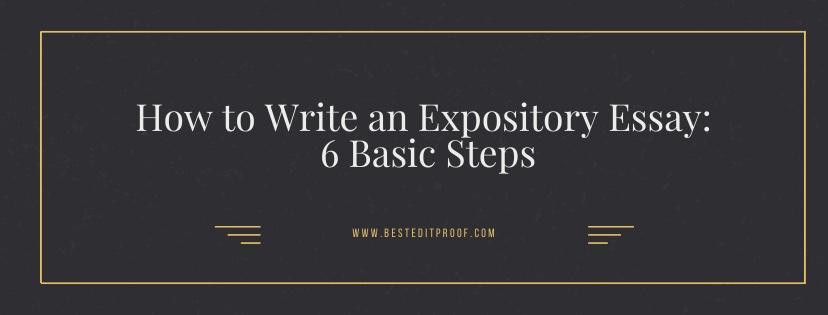
Essays are a principal component of academic writing . Scholars and students need to write a plethora of essays on a recurring basis as a core requirement of their research or curricula. Depending on the writing purpose, these essays can be persuasive, narrative, descriptive, or expository. This article expounds on expository essays and suggests some helpful steps to write an expository essay.
What are expository essays?
Expository essays aim to peruse a subject matter, assess the available factual information regarding that subject matter, and educate the readers on it. As opposed to persuasive/argumentative essays that try to convince the readers of the credibility of the author’s arguments, expository writing is formal and objective with the purpose of presenting information to the readers in a cogitable manner without taking sides.
Let us consider, for example, an essay on the detrimental effects of the Great Depression on the psyche of middle-class Americans. This essay will briefly mention what brought about the Great Depression and explain how the deteriorating economy negatively affected the mental health of the less financially well-off citizens. It will not include the author's opinions on corruption, malpractices, human rights issues, etc., and how the government could have mitigated them in those times. Also, since expository writing is straightforward, writers should avoid using tricky language, allusions, slang, and ilk.
Steps to writing expository essays
Expository essays are some of the most systematic and well-structured essays in academic writing. Hence, one needs to follow all the structural and writing guidelines of expository writing.
1. Conduct extensive research on the topic at hand
The first step to writing an essay is to have sound knowledge of the subject matter. This implies locating trustworthy sources, referring to them constantly, and writing plenty of notes.
Once sufficient information is collected, writers should then move on to creating a rough outline of the essay. Having an essay outline enables one to arrange the available information in a comprehensible manner. However, one should not strive to draft the perfect outline at the outset.
Also, one should not do the writing and research parallelly, as doing so will deteriorate the quality of their essays.
2. Pick a structure for the essay
Essays typically comprise five paragraphs:
Introduction
1st body paragraph
2nd body paragraph
3rd body paragraph
But one does not have to necessarily abide by this essay structure and can consult the teachers or supervisors for the word count and the number of paragraphs.
3. Formulate a thesis statement
A thesis statement is fundamental to any essay as it accentuates the crux of the essay. It is generally subsequent to the introductory paragraph and is one or two sentences long. The ideal way to write a thesis statement is to create a rough draft and revise it as the writing process progresses toward completion. Doing so ensures that the thesis statement is in line with the contents of the essay.
How to Structure a Thesis: A Complete Guide
How to Write a Thesis Statement | 6 Tips
How to Write a Perfect Ph.D. Thesis
Thesis vs. Research Paper: Know the Differences
Five common Mistakes When Writing a Thesis or Dissertation
4. Write an introductory paragraph with a hook
The introductory paragraph carries the onus of ensuring whether the readers will read the whole essay or leave midway. Thus, it is imperative for writers to write a compelling introductory paragraph , complete with a hook statement, that will pique the interest of the readers and tell them that the essay is worth their time.
5. Write the body paragraphs
The body paragraphs are equally important as the introductory as they carry the entire weight of the essay. Therefore, writers should make sure to include only incontestable and properly cited information. Also, since an essay is composed of several paragraphs, one should ensure that the transition from one paragraph to the other is seamless and there are minimal instances of incoherence.
How to Cite Sources in APA Referencing Style
Importance of Academic Referencing and Citing
9 Common Citation Mistakes in Academic Studies
Most Common Citation Styles: APA | Chicago | MLA
6. Summarize the expository essays
The final paragraph, i.e., the conclusion or summary, consists of reinstating the thesis statements with some input from the other paragraphs. A good conclusion effectively brings together the essay, ties all loose ends, and does not divulge any new information. As such, writers should not treat it as a mere obligation.
Expository essays are analytical, evidential, formal in tone, and educational. This makes it essential to have strong language skills and a knack for explaining complex concepts with ease. Hence, students and scholars should actively practice their writing skills and follow this guide to master expository writing.
If you need help, then contact Best Edit & Proof!
Best Edit & Proof expert editors aim to provide your manuscripts with proper scholarly and academic tone and style. They will significantly improve the chances of having your research manuscript accepted for publishing. They provide subject-area proofreading and editing services in several fields categorized under various disciplines. With our extensive knowledge and expertise, we will help you find the right tone and style for your manuscript.
If you need our subject-area editors to format your manuscripts, giving you the fundamental rules for formatting your manuscripts as described in your guidelines, such as APA, MLA, or Chicago/Turabian styles, then contact us. At Best Edit & Proof, our proofreaders and editors edit every type of academic paper . We have a user-friendly website and a simplified ordering process.

If you would like our subject-area editors and language experts to work on your project for the improvement of its academic tone and style, then please visit the order page. It is easy! It takes only a few minutes to submit your paper and complete the process. Click here to see how it works.
We have flat-rate pricing based on our type of service (editing or proofreading), word count, and turnaround time. Enter your word count or copy and paste your document into our pricing calculator to get an instant quote.
If you need support for editing and proofreading services, contact us . You can also e-mail us or use the 24/7 live chat module to get direct support. We have a 24/7 active live chat mode to offer you direct support along with qualified editors to refine and furbish your manuscript. Alternatively, you can text us through our WhatsApp business line.
Stay tuned for updated information about editing and proofreading services!
Follow us on Twitter, LinkedIn, Facebook, Instagram, and Medium .
For more posts, click here.
This article expounds on expository essays and suggests steps to write an effective one. To give you an opportunity to practice proofreading, we have left a few spelling, punctuation, or grammatical errors in the text. See if you can spot them! If you spot the errors correctly, you will be entitled to a 10% discount.
- Editing & Proofreading
- Citation Styles
- Grammar Rules
- Academic Writing
- Proofreading
- Microsoft Tools
- Academic Publishing
- Dissertation & Thesis
- Researching
- Job & Research Application
Similar Posts
How to Determine Variability in a Dataset
How to Determine Central Tendency
How to Specify Study Variables in Research Papers?
Population vs Sample | Sampling Methods for a Dissertation
How to Ensure the Quality of Academic Writing in a Thesis and Dissertation?
How to Avoid Anthropomorphism in Your Dissertation?
How to Write a Research Methodology Section for a Dissertation and Thesis
How to Write a Theoretical Framework for a Dissertation and Thesis?
How to Write Literature Review for a Dissertation and Thesis
How to Write a Dissertation and Thesis Introduction
Recent Posts
ANOVA vs MANOVA: Which Method to Use in Dissertations?
They Also Read

Embarking on an academic work is obligatory for every college student who wants to graduate one day. Such an academic work is considered one of the final and most fundamental practices in the curriculum for college students. Some students who embark on their academic writing projects may not actually be aware of the mistakes (whether trivial or vital) that may delay their graduation or cause them to lose marks, or points in their assignments. So, college students should pay attention to these tips to avoid making the errors herein discussed.

Academic writing is the type of writing style that requires a lot of attention to details, rules, and regulations. Mainly used for, as you might have guessed, academic purposes, it is one of the most common writing styles for professional works. However, as regulated and strict it is, it is also easier to make mistakes here. One such very common mistake that happens all the time for several researchers is sentence structuring. Sentence structuring has always been a little tricky, academic writing or not. That is why a great emphasis is made on them during the editing and proofreading phases. This article discusses the most common sentence structuring mistakes and how you can avoid them.
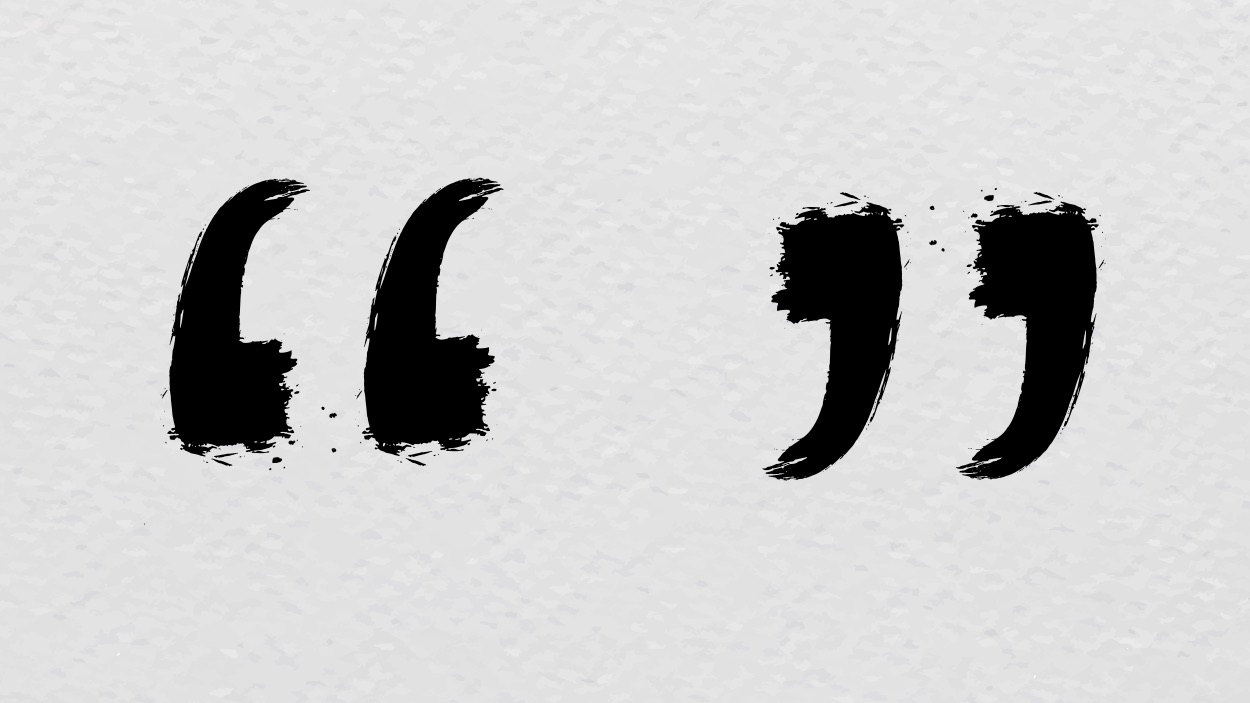
Whenever you use words, facts, ideas, or explanations from other works, those sources must be cited. Academic referencing is required when you have copied texts from an essay, an article, a book, or other sources verbatim, which is called quotation. You also need referencing when you use an idea or a fact from another work even if you haven’t used their exact expression.

While composing a thesis or dissertation, a student must experience some predicted traps. Falling into these traps can affect one’s academic career. However, handling potential blunders and pitfalls wisely, while developing a thesis, can lead you to success. The process of writing may be frustrating but learning about the probable pitfalls may ease your stress. Here, we bring you the list of the most common mistakes we have noticed as a professional proofreading and editing service provider.

It is not uncommon for individuals, academic and nonacademic to use “thesis” and “research paper” interchangeably. However, while the thesis vs. research paper puzzle might seem amusing to some, for graduate, postgraduate and doctoral students, knowing the differences between the two is crucial. Not only does a clear demarcation of the two terms help you acquire a precise approach toward writing each of them, but it also helps you keep in mind the subtle nuances that go into creating the two documents. This brief guide discusses the main difference between a thesis and a research paper.

Statistical analysis uses quantitative data and explores trends, patterns, and relationships. Thus, it is an indispensable instrument for researchers, states, firms, and many others. This article offers introductory knowledge on statistical analysis for students and researchers. After discussing descriptive and inferential statistics, it covers various research designs.

An abstract, is an important part of an academic work and a synopsis of a longer study such as a dissertation or thesis. Its most critical aspect is precise reporting of the objectives and outcomes of your research. Thus, the readers can learn about your work by perusing your abstract.
5 Expository Essay Examples (Full Text with Citations)
- Video Overview
- Quick Example
- Formatting Guide
An expository essay attempts to explain a topic in-depth, demonstrating expert knowledge and understanding.
This form of essay is structured around the clear, factual presentation of information, devoid of the writer’s personal opinions or arguments.
The primary goal is to inform or explain rather than persuade.
Unlike an argumentative essay, which is built around defending a particular point of view with evidence and persuasion, an expository essay maintains a neutral stance, focusing on delivering straightforward facts and explanations.
An example of expository writing could be an article explaining the process of photosynthesis.
The article would systematically describe each stage of how plants convert sunlight into energy, detailing the role of sunlight, water, and carbon dioxide.
It would explain the sequence of reactions – first, second, third, fourth, fifth – that occur and the importance of each step in supporting the life of the plant.
An expository essay generally follows this essay format:

- A) To persuade the reader to adopt a particular viewpoint
- B) To inform or explain a topic clearly
- C) To present the writer’s personal opinions and arguments
- D) To entertain the reader with creative writing
- A) An expository essay uses creative storytelling techniques
- B) An expository essay remains neutral and avoids personal opinions
- C) An expository essay focuses on persuading the reader with evidence
- D) An expository essay prioritizes the writer’s personal experiences
Expository Essay Examples
#1 impacts of technology on education.
955 words | 4 Pages | 15 References

Thesis Statement: “The integration of technology in education represents a complex and critical area of study crucial for understanding and shaping the future of educational practices.”
#2 Impacts of Globalization on Education
1450 words | 5 Pages | 9 References

Thesis Statement: “This essay examines the profound and multifaceted effects of globalization on education, exploring how technological advancements and policy reforms have transformed access to, delivery of, and perceptions of education.”
#3 The Role of Emotional Intelligence in Interpersonal Relationships
1211 Words | 5 Pages | 22 References

Thesis Statement: “The central thesis is that EI, defined as the ability to perceive, understand, and manage emotions, is a crucial determinant of success and well-being.”
#4 The Future of Renewable Energy Sources and Their Impact
870 words | 4 Pages | 20 References

Thesis Statement: “The essay posits that although renewable energy sources hold immense promise for a sustainable future, their full integration into the global energy grid presents significant challenges that must be addressed through technological innovation, economic investment, and policy initiatives.”
#5 The Psychology Behind Consumer Behavior
1053 words | 4 Pages | 17 References

Thesis Statement: “The thesis of this essay is that consumer behavior is not merely a product of rational decision-making; it is deeply rooted in psychological processes, both conscious and subconscious, that drive consumers’ choices and actions.”
How to Write an Expository Essay

Unlike argumentative or persuasive essays, expository essays do not aim to convince the reader of a particular point of view.
Instead, they focus on providing a balanced and thorough explanation of a subject.
Key characteristics of an expository essay include:
- Clarity and Conciseness
- Structured Organization (Introduction, Body, Conclusion)
- Objective Tone
- Evidence-Based (Cite academic sources in every body paragraph)
- Objective thesis statement (see below)
- Informative purpose (Not argumentative)
You can follow my expository essay templates with AI prompts to help guide you through the expository essay writing process:

How to write a Thesis Statement for an Expository Essay
An expository thesis statement doesn’t make an argument or try to persuade. It uses ‘is’ rather than ‘ought’ statements.
Take these comparisons below. Note how the expository thesis statements don’t prosecute an argument or attempt to persuade, while the argumentative thesis statements clearly take a side on an issue:
💡 AI Prompt for Generating Sample Expository Thesis Statements An expository essay’s thesis statement should be objective rather than argumentative. Write me five broad expository thesis statement ideas on the topic “[TOPIC]”.
Go Deeper: 101 Thesis Statement Examples
Differences Between Expository and Argumentative Essays
Expository and argumentative essays are both common writing styles in academic and professional contexts, but they serve different purposes and follow different structures.
Here are the key differences between them:
- Expository Essay : The primary purpose is to explain, describe, or inform about a topic. It focuses on clarifying a subject or process, providing understanding and insight.
- Argumentative Essay : The goal is to persuade the reader to accept a particular point of view or to take a specific action. It’s about presenting a stance and supporting it with evidence and logic.
- Expository Essay : It maintains a neutral and objective tone. The writer presents information factually and impartially, without expressing personal opinions or biases.
- Argumentative Essay : It often adopts a more assertive, persuasive, and subjective tone. The writer takes a clear position and argues in favor of it, using persuasive language.
- Expository Essay : The reader is expected to gain knowledge, understand a process, or become informed about a topic. There’s no expectation for the reader to agree or disagree.
- Argumentative Essay : The reader is encouraged to consider the writer’s viewpoint, evaluate arguments, and possibly be persuaded to adopt a new perspective or take action.
Go Deeper: Expository vs Argumentative Essays
Ready to Write your Essay?

Take action! Choose one of the following options to start writing your expository essay now:
Read Next: Process Essay Examples

Chris Drew (PhD)
Dr. Chris Drew is the founder of the Helpful Professor. He holds a PhD in education and has published over 20 articles in scholarly journals. He is the former editor of the Journal of Learning Development in Higher Education. [Image Descriptor: Photo of Chris]
- Chris Drew (PhD) https://helpfulprofessor.com/author/chris-drew-phd/ 15 Self-Actualization Examples (Maslow's Hierarchy)
- Chris Drew (PhD) https://helpfulprofessor.com/author/chris-drew-phd/ Forest Schools Philosophy & Curriculum, Explained!
- Chris Drew (PhD) https://helpfulprofessor.com/author/chris-drew-phd/ Montessori's 4 Planes of Development, Explained!
- Chris Drew (PhD) https://helpfulprofessor.com/author/chris-drew-phd/ Montessori vs Reggio Emilia vs Steiner-Waldorf vs Froebel
Leave a Comment Cancel Reply
Your email address will not be published. Required fields are marked *
How to Write an Expository Essay: Outline, & Example
What is an expository essay? This type of writing aims to inform the reader about the subject clearly, concisely, and objectively.
The keyword here is “ inform ”. You are not trying to persuade your reader to think a certain way or let your own opinions and emotions cloud your work. Just stick to the facts.
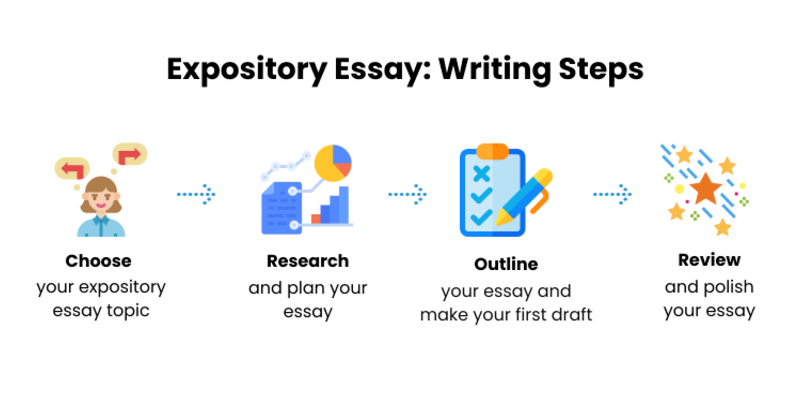
Want to learn more? This article by Custom-writing experts will tell you how to write an expository essay step by step! It provides a definition and describes types of expository writing. It also contains tips on choosing a topic and making an outline, ideas for an introduction and conclusion, as well as useful structuring and formatting tips.
- 🔖 Expository Essay Types
- 👣 4-Step Writing Guide
🔗 References
🔖 types of expository writing.
Whenever an essay or article explains complicated details or simplifies a bulk of hard-to-understand information, this type of writing is called expository.
Imagine you are talking to a curious child who keeps asking you “how” and “why” things are such or another. You need to explain everything from scratch, yet making it sound compelling. Small and peculiar details are essential here.
The principal purpose of an expository essay is to elucidate a topic logically and consistently. It is an objective analysis of facts without any reference to the writer’s emotions or opinions.
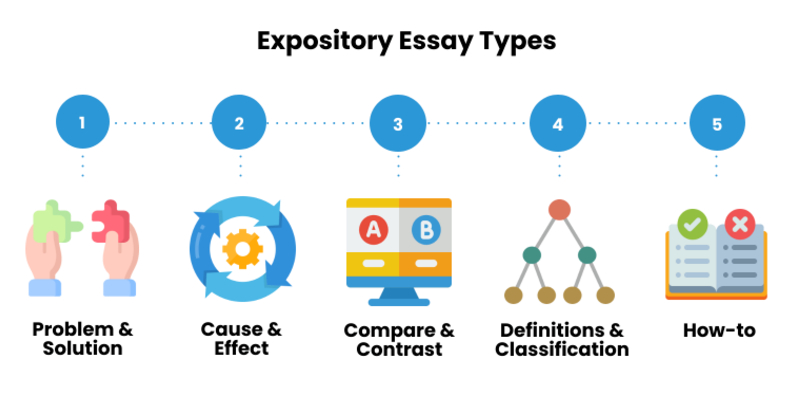
👣 How to Write an Expository Essay Step by Step
🔍 step 1: choose your expository essay topic.
The first step of the writing process implies that you brainstorm, make a list of expository essay ideas, and then choose the topic you like most. Note that your topic shouldn’t be either too broad or too narrow.
Let’s take a look at the expository essay topic examples:
And here are some good expository essay topics that would be a good choice:
- Why does the human body need food and water ?
- What are the different ways to travel long distances?
- General information about audit report.
- Compare the legacy of any two US presidents.
- How can crime be reduced in your local community?
- What is the best way to learn a new language ?
- Establishing successful communication between managers and employees.
- Why do companies use memes as branding strategy ?
- The meaning of the terms diversity and identity .
- Describe how the work climate influence employee performance.
- What emotional appeal is and its role in communication.
- Information’s importance in warfare and commerce.
- Ways to use social media in modern business.
- Basic information and requirements of police detective career .
- What is health information exchange ?
- Characteristics of demonstrative communication.
- The history of the Cow Palace , Daly City.
- Describe the specifics of insurance company business.
- Ways to success in dealing with other people .
- Discuss the significant role of polis in ancient Greece .
- General information about cardiovascular disease .
- What are futuristic fabrics and how are they used in the modern fashion industry?
- Outline the peculiarities and cultural aspects of Indian cuisine .
- Describe the role of waiter in tourism industry .
- Ways to help students with learning disabilities to retain information.
- Four components of information system .
- Code of ethics: definition and its role in decision–making.
- The importance of listening skills .
- Present the similarities and differences between Mesopotamia and Ancient Egyptian culture .
- Give details on climate change in Africa .
- What is emotional intelligence and why is it important?
- Report the main methods to improve student learning .
- Describe the basic components of management practices.
- Contingency theory for effective crisis management.
- Ways of determining the validity of information sources .
- The specifics of coffee culture in different countries.
- Represent the main approaches to managing the team of international managers.
- Describe the peculiarities of popular culture .
- Information about Ferrero company.
- What is a leadership theory and how is it applicable in management?
- Tell about the ways to cite sources for an informative speech .
- The impact of vitamin D on human health.
- Definition and types of plastic surgery .
- How climate changes influence food security .
- Available information about silicon .
- Describe the mediation process and the difficulties usually connected with it.
- What is intelligence and how is it measured?
- Compare the advantages and disadvantages of electric and gas cars .
- General information about mental disorders.
- Outline the most high-risk nutritional practices and their impact on human health.
You might be given a specific topic, or you might have the freedom to choose one. Either way, your starting point is to look at the task you have been set and be sure that your focus remains within its boundaries.
If you do have a choice, then go for a subject that you already have some knowledge of as this will give you a head start at the planning stage. And choose something that interests you—you are probably going to be doing a lot of reading, so that process will be much easier if your curiosity is carrying you forward.
📑 Step 2: Research and Plan Your Essay
Consider your audience.
It’s always worth clarifying with your teacher who your essay’s intended audience is if it’s not clearly stated in the instructions. Your readership might be limited to your teacher or whoever is assessing your work, so the main goal, in that case, is to convince them that you have a good understanding of the subject and can organize your thoughts in a clear and appropriate way.
Either way, you should be mindful of who you intend to inform as you carry out your research and planning.
Choose Your Sources
You will need to find multiple sources that are relevant and reliable in order to deal with your subject matter accurately and comprehensively. Below is a checklist that might help you choose the right sources for your essay.:
Academic Sources Checklist
Take notes as you read, and cross-check sources. Your goal is to formulate the points you need to deal with the set task and find evidence to support them.
Once you’ve completed this, you will have a clear sense of direction, and if it hasn’t already been assigned, you will be able to compose a thesis statement for your essay that meets the requirements of the task and fits your sources. If you still struggle with the statement, consider trying an expository essay thesis generator to help yourself out.
Now you’re ready to lay down your expository essay outline!
✍️ Step 3: Make Your Expository Essay Outline & Draft
The five-paragraph essay is a classic literary composition and a perfect template for your expository essay format—even if your set task demands something longer.
The outline for a 5-paragraph expository essay is simple:
- Introduction (one paragraph)
- Main body (three paragraphs)
- Conclusion (one paragraph)
Expository Essay Structure: Useful Tips
- Make the introduction of your expository essay short and sweet. Start with a focus statement that will grab your reader’s attention and make them want to read on. Then give an overview of your subject matter and set out the direction that the rest of your essay is going to take. There’s no need to back up your words with evidence at this stage—save the meat and potatoes for the main course.
- Organize the three (or more if necessary) paragraphs of the main body in a logical order. Each of them should deal with a different point and address the focus statement you started with.Begin each paragraph with a clear topic sentence, then support it with your evidence. Each paragraph’s final sentence should lead your reader into the next—just like this one, which says you’re now ready to tie it all up.
- Restate your original focus statement in your expository essay conclusion. his time, include the weight of all the evidence you have provided in the main body. Follow this with a powerful closing statement, and your reader will be on the ropes.
🏁 Step 4: Review Your Expository Essay
Think of your expository essay’s first draft as an uncut diamond—the value is there, but you still have some work to do before it’s ready for the display cabinet at Tiffany and Co.
First, you need to look at the overall content of your essay and ask the questions below.
Expository Essay Checklist: Content
- Does the essay stay focused on the set task throughout?
- Does the introduction give a clear sense of where the rest of the essay is headed?
- Does the main body cover the subject matter in a logical order?
- Is your supporting evidence accurate, relevant, and properly referenced?
- Does the conclusion tie up the essay in a clear, concise, and powerful way?
- Have you stuck to the facts and avoided clouding the essay with your own opinions?
- Will your reader find your essay engaging and enjoyable to read?
- Will your reader be better informed about the subject matter once they have finished the essay?
Be hard on yourself when you go through this process. Step into the shoes of the most critical person you know who loves to highlight your faults. You will come out the other side leaner, meaner, and stronger.
You’re almost there now—just some final polishing required. Your essay is now almost perfect, but proofreading will make it shine. Run it through a spell-checker, then read slowly from the beginning again, asking the questions below.
Expository Essay Checklist: Style
- Is your word choice clear and concise?
- Are there any issues with grammar or spelling?
- Have you been consistent with the use of abbreviations, acronyms, capitalization, etc.?
- Are your quotations and references presented correctly and consistently?
- Is your document formatted correctly and consistently?
Done all that? Congratulations! Your diamond was purchased by Jennifer Lopez, and she plans to show it off on the Oscars red carpet.
The great thing about expository essays is that you only need to concern yourself with the facts. If you follow these four steps, you can’t go wrong. And in addition to your A+ grade, you will also have gained an incredibly useful life skill. The ability to explain a concept to someone in a way that makes them better informed will take you a long way in any environment.
✒️ Expository Essay Example
In this section, you’ll find a free expository essay sample. It focuses on the factors that cause stress in adolescents. Note that the full version of the text is downloadable!
Major Stressors in Teenagers’ Lives
The high dynamics of social interactions is a factor that may cause the fear and anxiety in adolescents who face increased demands and expectations from adults. Being physically developed, teenagers often have a fragile psychological background, and various external drivers, usually related to social adaptation, can be dangerous triggers of stress.
Adolescents are rarely able to entrust their concerns to parents and other adults, which causes isolation, pathological anxiety, and even suicidal thoughts. The major stressors in adolescence are social in nature and relate to school relationships, family disagreements, and issues of friendship and love.
✏️ Expository Essay FAQ
In simple terms, an expository essay informs its readers about a subject. It is quite concise, and typically presents a topic with 2-3 subtopics and relevant examples. To make the definition complete, we need to add that you also show your understanding of the topic as you write that paper.
If you are a high school student, we strongly recommend that you start off by creating an outline. You need to highlight a few points in the Body of your essay. Then, create an appropriate introduction. Finally, add a corresponding conclusion.
An expository essay is one of the most typical tasks starting from middle school. Thus, if you are not sure about the essay structure, write an outline first. Then you go step by step: an Introduction, Body, Conclusion. You may write the Body first and add the other two afterward.
An expository essay does not have significant peculiarities in terms of structure. Its outline includes: an Introduction, some Body paragraphs with examples, a Conclusion. Do not choose too many subtopics: such essays are usually just about 5 paragraphs / two pages long.
- Taking Notes from Research Reading:University of Toronto
- Expository Essays // Purdue Writing Lab
- What Is Expository Writing? – ThoughtCo
- Tips on Writing an Excellent Expository Essay – YourDictionary
- 10 Ways Expository Writing Skills: NY Tymes
- Expository Essays: Types, Characteristics & Examples – Study.com
- Share to Facebook
- Share to Twitter
- Share to LinkedIn
- Share to email
![techniques of writing expository essay Short Story Analysis: How to Write It Step by Step [New]](https://custom-writing.org/blog/wp-content/uploads/2020/12/man-sits-end-trolltunga-before-mountains-284x153.jpg)
Have you ever tried to write a story analysis but ended up being completely confused and lost? Well, the task might be challenging if you don’t know the essential rules for literary analysis creation. But don’t get frustrated! We know how to write a short story analysis, and we are...
![techniques of writing expository essay Common Essay Mistakes—Writing Errors to Avoid [Updated]](https://custom-writing.org/blog/wp-content/uploads/2020/12/avoid-mistakes-ccw-284x153.jpg)
One of the most critical skills that students gain during their college years is assignment writing. Composing impressive essays and research papers can be quite challenging, especially for ESL students. Nonetheless, before learning the art of academic writing, you may make numerous common essay mistakes. Such involuntary errors appear in:...

You’re probably thinking: I’m no Mahatma Gandhi or Steve Jobs—what could I possibly write in my memoir? I don’t even know how to start an autobiography, let alone write the whole thing. But don’t worry: essay writing can be easy, and this autobiography example for students is here to show...
![techniques of writing expository essay Why I Want to Be a Teacher Essay: Writing Guide [2024]](https://custom-writing.org/blog/wp-content/uploads/2020/12/senior-male-professor-writing-blackboard-with-chalk3-284x153.jpg)
Some people know which profession to choose from childhood, while others decide much later in life. However, and whenever you come to it, you may have to elaborate on it in your personal statement or cover letter. This is widely known as “Why I Want to Be a Teacher” essay.
![techniques of writing expository essay Friendship Essay: Writing Guide & Topics on Friendship [New]](https://custom-writing.org/blog/wp-content/uploads/2020/12/smiley-female-friends-fist-bumping-284x153.jpg)
Assigned with an essay about friendship? Congrats! It’s one of the best tasks you could get. Digging through your memories and finding strong arguments for this paper can be an enjoyable experience. I bet you will cope with this task effortlessly as we can help you with the assignment. Just...

When you are assigned an autobiography to write, tens, and even hundreds of questions start buzzing in your head. How to write autobiography essay parts? What to include? How to make your autobiography writing flow? Don’t worry about all this and use the following three simple principles and 15 creative...

“Where is your thesis statement?” asks your teacher in a dramatic tone. “Where is my what?” you want to reply, but instead, you quickly point your finger at a random sentence in your paper, saying, “Here it is…” To avoid this sad situation (which is usually followed by a bad...

A life experience essay combines the elements of narration, description, and self-reflection. Such a paper has to focus on a single event that had a significant impact on a person’s worldview and values. Writing an essay about life experience prompts students to do the following: You may struggle with such...

Who has made a significant impact in your life and why? Essay on the topic might be challenging to write. One is usually asked to write such a text as a college admission essay. A topic for this paper can be of your choice or pre-established by the institution. Either...

Are you about to start writing a financial assistance essay? Most probably, you are applying for a scholarship that will provide additional funding for your education or that will help you meet some special research objectives.
![techniques of writing expository essay Growing Up Essay: Guide & Examples [2024]](https://custom-writing.org/blog/wp-content/uploads/2020/12/gardening-concept-with-mother-daughter-284x153.jpg)
What does it mean to grow up? Essays on this topic might be entertaining yet challenging to write. Growing up is usually associated with something new and exciting. It’s a period of everything new and unknown. Now, you’ve been assigned to write a growing up essay. You’re not a kid...
![techniques of writing expository essay Murder Essay: Examples, Topics, and Killer Tips [2024]](https://custom-writing.org/blog/wp-content/uploads/2020/12/man-holding-gun-as-evidence-284x153.jpeg)
Probably, a murder essay is not a fascinating assignment to complete. Talking about people’s deaths or crazy murderers can be depressing. However, all assignments are different, and you are supposed to work on every task hard. So, how are you going to deal with a murder essay? You can make...
How would I cite this site?

Bill, here you can find the information about citation
I really love this, thanks.
Lovely explanation
More From Forbes
5 strategies to unlock your winning college essay.
- Share to Facebook
- Share to Twitter
- Share to Linkedin
CAMBRIDGE, MASSACHUSETTS - JUNE 29: People walk through the gate on Harvard Yard at the Harvard ... [+] University campus on June 29, 2023 in Cambridge, Massachusetts. The U.S. Supreme Court ruled that race-conscious admission policies used by Harvard and the University of North Carolina violate the Constitution, bringing an end to affirmative action in higher education. (Photo by Scott Eisen/Getty Images)
The college application season is upon us, and high school students everywhere are staring down at one of the most daunting tasks: the college essay. As someone who has guided countless applicants through the admissions process and reviewed admissions essays on an undergraduate admissions committee, I've pinpointed the essential ingredient to a differentiated candidacy—the core of your college admissions X-factor .
The essential ingredient to your college admissions X-factor is your intellectual vitality. Intellectual vitality is your passion for learning and curiosity. By demonstrating and conveying this passion, you can transform an average essay into a compelling narrative that boosts your chances of getting accepted to your top schools. Here are five dynamic strategies to achieve that goal.
Unleash Your Authentic Voice
Admissions officers sift through thousands of essays every year. What stops them in their tracks? An authentic voice that leaps off the page. Forget trying to guess what the admissions committee wants to hear. Focus on being true to yourself. Share your unique perspective, your passions, and your values. Authenticity resonates deeply with application reviewers, making your essay memorable and impactful. You need not have experienced trauma or tragedy to create a strong narrative. You can write about what you know—intellectually or personally—to convey your enthusiasm, creativity, and leadership. Intellectual vitality shines through when you write with personalized reflection about what lights you up.
Weave A Captivating Story
Everyone loves a good story, and your essay is the perfect place to tell yours. The Common Application personal statement has seven choices of prompts to ground the structure for your narrative. The most compelling stories are often about the smallest moments in life, whether it’s shopping at Costco or about why you wear socks that have holes. Think of the Common Application personal statement as a window into your soul rather than a dry list of your achievements or your overly broad event-based life story. Use vivid anecdotes to bring your experiences to life. A well-told story can showcase your growth, highlight your character, and illustrate how you've overcome challenges. Intellectual vitality often emerges in these narratives, revealing how your curiosity and proactive approach to learning have driven you to explore and innovate.
Reflect And Reveal Insights
It's not just about what you've done—it's about what you've learned along the way. When you are writing about a specific event, you can use the STAR framework—situation, task, action, and result (your learning). Focus most of your writing space on the “R” part of this framework to dive deeply into your experiences and reflect on how they've shaped your aspirations and identity.
Google Chrome Deadline—72 Hours To Update Or Delete Your Browser
The fed quietly admits gold is replacing the dollar as collapse fear predicted to trigger a 15 7 trillion etf bitcoin price flip, apple loop iphone 16 pro details ios 18 s ai plans iphone 14 pro special offer.
The most insightful college-specific supplement essays demonstrate depth of thought, and the ability to connect past experiences with your future life in college and beyond. Reflecting on your intellectual journey signals maturity and a readiness to embrace the college experience. It shows admissions officers that you engage deeply with your studies and are eager to contribute to the academic community.
Highlight Your Contributions—But Don’t Brag
Whether it's a special talent, an unusual hobby, or a unique perspective, showcasing what you can bring to the college environment can make a significant impact. Recognize that the hard work behind the accomplishment is what colleges are interested in learning more about—not retelling about the accomplishment itself. (Honors and activities can be conveyed in another section of the application.) Walk us through the journey to your summit; don’t just take us to the peak and expect us know how you earned it.
Intellectual vitality can be demonstrated through your proactive approach to solving problems, starting new projects, or leading initiatives that reflect your passion for learning and growth. These experiences often have a place in the college-specific supplement essays. They ground the reasons why you want to study in your major and at the particular college.
Perfect Your Prose
Great writing is essential. Anyone can use AI or a thesaurus to assist with an essay, but AI cannot write your story in the way that you tell it. Admissions officers don’t give out extra credit for choosing the longest words with the most amount of syllables.
The best essays have clear, coherent language and are free of errors. The story is clearly and specifically told. After drafting, take the time to revise and polish your writing. Seek feedback from teachers, mentors, or trusted friends, but ensure the final piece is unmistakably yours. A well-crafted essay showcases your diligence and attention to detail—qualities that admissions officers highly value. Intellectual vitality is also reflected in your writing process, showing your commitment to excellence and your enthusiasm for presenting your best self.
Crafting a standout college essay is about presenting your true self in an engaging, reflective, and polished manner while showcasing your intellectual vitality. Happy writing.

- Editorial Standards
- Reprints & Permissions
Home — Blog — Topic Ideas — 200 Ethical Topics & Questions to Debate in Essay
200 Ethical Topics & Questions to Debate in Essay

Ethical topics and questions are essential for stimulating thoughtful discussions and deepening our understanding of complex moral landscapes. Ethics, the study of what is right and wrong, underpins many aspects of human life and societal functioning. Whether you're crafting an essay or preparing for a debate, delving into ethical issues allows you to explore various perspectives and develop critical thinking skills.
Ethical issues encompass a wide range of dilemmas and conflicts where individuals or societies must choose between competing moral principles. Understanding what are ethical issues involves recognizing situations that challenge our values, behaviors, and decisions. This article provides a thorough guide to ethical topics, offering insights into current ethical issues, and presenting a detailed list of questions and topics to inspire your writing and debates.
Ethical Issues Definition
Ethical issues refer to situations where a decision, action, or policy conflicts with ethical principles or societal norms. These dilemmas often involve a choice between competing values or interests, such as fairness vs. efficiency, privacy vs. security, or individual rights vs. collective good. Ethical issues arise in various fields, including medicine, business, technology, and the environment. They challenge individuals and organizations to consider the moral implications of their actions and to seek solutions that align with ethical standards. Understanding ethical issues requires an analysis of both the potential benefits and the moral costs associated with different courses of action.
⭐ Top 10 Ethical Topics [2024]
- Climate Change Responsibility
- Data Privacy in the Digital Age
- Genetic Engineering
- Euthanasia and Assisted Suicide
- Corporate Social Responsibility
- AI and Automation
- Animal Rights
- Freedom of Speech vs. Hate Speech
- Healthcare Accessibility
- Human Rights in the Age of Globalization
Ethics Essay Writing Guide
Writing an ethics essay involves more than just presenting facts; it requires a thoughtful analysis of moral principles and their application to real-world scenarios. Understanding ethical topics and what constitutes ethical issues is essential for crafting a compelling essay. Here’s a guide to help you address current ethical issues effectively:
- Choose a Clear Topic: Select an ethical issue that is both interesting and relevant. Understanding the definition of ethical issues will help you narrow down your choices.
- Research Thoroughly: Gather information from credible sources to support your arguments. Knowing what ethical issues are and how they are defined can provide a solid foundation for your research.
- Present Multiple Perspectives: Show an understanding of different viewpoints on the issue. This will demonstrate your grasp of the complexity of current ethical issues.
- Use Real-world Examples: Illustrate your points with concrete examples. This not only strengthens your arguments but also helps to explain ethical topics in a relatable way.
- Structure Your Essay: Organize your essay with a clear introduction, body, and conclusion. A well-structured essay makes it easier to present your analysis of ethical issues.
- Provide a Balanced Argument: Weigh the pros and cons to offer a well-rounded discussion. Addressing various aspects of current ethical issues will make your essay more comprehensive.
- Conclude Thoughtfully: Summarize your findings and reflect on the broader implications of the issue. This is where you can discuss the impact of ethical issues on society and future considerations.
By following this guide, you will be able to write an ethics essay that not only presents facts but also offers a deep and nuanced analysis of ethical topics.
Selecting the Right Research Topic in Ethics
Choosing the right research topic in ethics can be challenging, but it is crucial for writing an engaging and insightful essay. Here are some tips:
- Relevance: Ensure the topic is relevant to current societal issues.
- Interest: Pick a topic that genuinely interests you.
- Scope: Choose a topic with enough scope for research and debate.
- Complexity: Aim for a topic that is complex enough to allow for in-depth analysis.
- Availability of Sources: Make sure there are enough resources available to support your research.
What Style Should an Ethics Essay Be Written In?
When writing an ethics essay, it is essential to adopt a formal and objective style. Clarity and conciseness are paramount, as the essay should avoid unnecessary jargon and overly complex sentences that might obscure the main points. Maintaining objectivity is crucial; presenting arguments without bias ensures that the discussion remains balanced and fair. Proper citations are vital to give credit to sources and uphold academic integrity.
Engaging the reader through a logical flow of ideas is important, as it helps sustain interest and facilitates a better understanding of the ethical topics being discussed. Additionally, the essay should be persuasive, making compelling arguments supported by evidence to effectively convey the analysis of moral issues. By following these guidelines, the essay will not only be informative but also impactful in its examination of ethical dilemmas.
List of Current Ethical Issues
- The impact of social media on privacy.
- Ethical considerations in genetic cloning.
- Balancing national security with individual rights.
- Privacy concerns in the digital age.
- The ethics of biohacking.
- Ethical considerations in space exploration.
- The ethics of surveillance and data collection by governments and corporations.
- Ethical issues in the use of facial recognition technology.
- The ethical implications of autonomous vehicles.
- The morality of animal testing in scientific research.
- Ethical concerns in the gig economy.
- The impact of climate change on ethical business practices.
- The ethics of consumer data usage by companies.
- Ethical dilemmas in end-of-life care and assisted suicide.
- The role of ethics in the development of renewable energy sources.
Ethical Issues in Psychology
- Confidentiality vs. duty to warn in therapy.
- Ethical dilemmas in psychological research.
- The use of placebo in psychological treatment.
- Ethical issues in the treatment of vulnerable populations.
- The ethics of involuntary commitment and treatment.
- Dual relationships and conflicts of interest in therapy.
- The use of deception in psychological experiments.
- The ethics of cognitive enhancement drugs.
- Ethical considerations in online therapy and telepsychology.
- Cultural competence and ethical practice in psychology.
- The ethics of forensic psychology and assessment.
- The impact of social media on mental health and ethical practice.
- The use of emerging technologies in psychological treatment.
- Ethical issues in the diagnosis and treatment of mental disorders.
- The role of ethics in psychological testing and assessment.
Ethical Debate Topics
- Is capital punishment morally justified?
- Should organ donation be mandatory?
- The ethics of artificial intelligence in warfare.
- Is euthanasia ethically permissible?
- Should human cloning be allowed?
- The morality of animal rights vs. human benefit.
- Is it ethical to use animals for entertainment?
- Should there be limits on free speech?
- The ethics of genetic modification in humans.
- Is it ethical to have mandatory vaccinations?
- The morality of government surveillance programs.
- Should assisted reproductive technologies be regulated?
- The ethics of using performance-enhancing drugs in sports.
- Should healthcare be considered a human right?
- The ethical implications of wealth inequality and redistribution.
Medical Ethics Topics
- Ariel Case Study: a Comprehensive Analysis
- The Case for and Against Daylight Saving Time
- Technological Advancements in Medical, Educational & Other Fields
- The Language of Medicine
- Medical Ethics: Beneficence and Non-maleficence
- Overview of What Sonography is
- The Use of Steroids and HGH in Sports
- Media and The Scientific Community Treat People Like Tools
- Informative Speech for Organ Donation
- Medicine in Our World
- The Origin of Medical Terminology
- Preserving Sight: My Journey to Becoming an Optometrist
- Case of Dr. Eric Poehlman's Ethical Violation
- Should The NHS Treat Patients with Self-Inflicted Illnesses
- My Education as a Medical Technologist
Ethics Essay Topics on Business
- Ethics Report on Panasonic Corporation
- Case Study on The ACS Code of Morals
- Differences in Business Ethics Among East Asian Countries
- Business Ethics in Sports
- Business Ethics in Different Countries, and Its Importance
- Selfless Service and Its Impact on Social Change
- Challenges in Doing Business Across The Border
- The Importance of Ethics in Advertising
- Ethical Issues that Businesses Face
- Profitability of Business Ethics
- The Law and Morality in Business
- How Ethnic Variances Effect Worldwide Business
- The Ethical Practices in The Business Sector in the Modern Economy
- Key Responsibilities and Code of Ethics in Engineering Profession
- Analysis of The Code of Ethics in Walmart
Ethics Essay Topics on Environment
- Understanding The Importance of Keeping Animals Safe
- The Importance of Treating Animals with Respect
- CWU and The Issue of Chimpanzee Captivity
- The Process of Suicidal Reproduction in the Animal World
- Analysis of The Egg Industry to Understand The Causes of The High Prices in Eggs
- The Dangers of Zoos
- Importance for Animals to Be Free from Harm by Humans
- Should Animals Be Killed for The Benefit of Humans
- Reasons Why Genetic Engineering Should Be Banned
- What I Learned in Ethics Class: Environmental Ethics
- Nanotechnology and Environment
- Review of The Environmental Protection Act
- How The Idea of Preservation of Nature Can Benefit from Environmental Ethics
- The Relation and Controversy Between American Diet and Environmental Ethics
- Green Technology
Work Ethics Essay Topics
- The impact of workplace surveillance on employee privacy.
- Ethical considerations in remote work.
- Discrimination in the workplace.
- An Examination of Addiction to Work in The Protestant Work Ethic
- The Work Ethic of The Millennials
- My Understanding of The Proper Environment in the Workplace
- Social Responsibility & Ethics Management Program in Business
- The Maternity Benefits Act, 1961
- The Issue of Stealing in The Workplace
- Chinese Work Management and Business Identity
- Ethical Issues of Using Social Media at the Workplace
- The Teleological Ethical Theories
- Learning Journal on Ethical Conflicts, Environmental Issues, and Social Responsibilities
- Social Media at Workplace: Ethics and Influence
- Ethical Issue of Employees Stealing and Whistleblowing
Ethics Essay Topics on Philosophy
- A Critical Analysis of Ethical Dilemmas in Education and Beyond
- Overview of What an Ethical Dilemma is
- The Implications of Exculpatory Language
- Ethical Dilemmas in End-of-life Decision Making
- What I Learned in Ethics Class: Integrating Ethics in Aviation
- Doing What is Right is not Always Popular: Philosophy of Ethics
- An Analysis of Public Trust and Corporate Ethics
- Ethical Concerns of Beauty Pageants
- Simone De Beauvoir’s Contribution to Philosophy and Ethics
- The Impact on Decision-making and Life Choices
- Importance and Improvement of Personal Ethics
- Personal Ethics and Integrity in Our Life
- Analysis of The Philosophical Concept of Virtue Ethics
- Understanding Moral Action
- How to Become a Gentleman
- A Call for Emphasis on Private Morality and Virtue Teaching
- A Positive Spin on Ethical Marketing in The Gambling Industry
- An Overview of The Ethical Dilemma in a Personal Case
- Bioethical Principles and Professional Responsibilities
- Ethical Considerations in Counseling Adolescents
- Ethical Dilemma in College Life
- Ethical Theories: Deontology and Utilitarianism
- Issues of Fraud, Ethics, and Regulation in Healthcare
- Navigating Ethical Dimensions in Education
- The Ethical Landscape of Advanced Technology
- Research Paper on The Ethical Issue of Publishing The Pentagon Papers
- The Trolley Problem: an Ethical Dilemma
- Analysis of "To The Bitter End" Case Study
- Ethical Theories: Virtue and Utilitarian Ethics
- Feminist Ethics: Deconstructing Gender and Morality
- Is Deadpool a Hero Research Paper
- My Moral and Ethical Stance
- The Concept of Ethics and The Pursuit of Happiness
- The Ethics of Graphic Photojournalism
- The Quintessence of Justice: a Critical Evaluation of Juror 11's Role
- The Wolf of Wall Street: Ethics of Greed
- The Importance of Ethics in Our Daily Life
- Analysis of The Envy Emotion and My Emotional Norms
- The Topic of Animal Rights in Relation to The Virtue Theory
Ethics Essay Topics on Science
- The Cause of Cancer as Illustrated in a Bioethics Study
- Bioethical Issues Related to Genetic Engineering
- Ethical Issues in Stem Cell Research
- The Role of Ethics Committees in Biomedical Research
- The Legal and Bioethical Aspects of Personalised Medicine Based on Genetic Composition
- The Ethics of Clinical Trials: Ensuring Informed Consent and Patient Safety
- Ethical Challenges in Neuroethics: Brain Privacy and Cognitive Liberty
- Gene Therapy: Ethical Dilemmas and Social Implications
- Overview of Bioethics The Trigger of Contentious Moral Topics
- The Progression of Bioethics and Its Importance
- The Impact of Artificial Intelligence on Medical Ethics
- The Drawbacks of Free Healthcare: Economic, Quality, and Access Issues
- Bioethical Issues in My Sister’s Keeper: Having Your Autonomy Taken to Save Your Sibling
- The Ethics of Biotechnology in Agriculture: GMOs and Food Safety
- Ethical Considerations in Organ Donation and Transplantation
List of Ethical Questions for Students
Exploring ethical topics is crucial for students to develop critical thinking and moral reasoning. Here is a comprehensive list of ethical questions for students to discuss and debate. These topics cover a wide range of issues, encouraging thoughtful discussion and deeper understanding.
Good Ethical Questions for Discussion
- Is it ethical to eat meat?
- Should parents have the right to genetically modify their children?
- Is it ever acceptable to lie?
- Should schools monitor students' social media activity?
- Is it ethical to use animals in scientific research?
- Should companies be allowed to patent human genes?
- Is it right to impose cultural values on others?
- Should the government regulate internet content?
- Is it ethical to have designer babies?
- Should wealthy countries help poorer nations?
- Is it ethical to keep animals in zoos?
- Should there be limits to freedom of speech?
- Is it right to use artificial intelligence in decision-making?
- Should we prioritize privacy over security?
- Is it ethical to manipulate emotions through advertising?
Moral Questions to Debate
- Is genetic modification in humans ethical?
- Should vaccinations be mandatory?
- Is government surveillance justified?
- Is it ethical to use performance-enhancing drugs in sports?
- Is wealth inequality morally acceptable?
- Should education be free for everyone?
- Is it ethical to allow autonomous robots to make life-and-death decisions?
Ethical topics and questions are a rich field for exploration and discussion. Examining these issues, we can better understand the moral principles that guide our actions and decisions. Whether you're writing an essay or preparing for a debate, this comprehensive list of ethical topics and questions will help you engage with complex moral dilemmas and develop your critical thinking skills.

We use cookies to personalyze your web-site experience. By continuing we’ll assume you board with our cookie policy .
Bar Exam Toolbox Podcast Episode 265: Quick Tips -- What If You Run Out of Time While Writing a Bar Essay Answer?
In this episode, we discuss:
>What happens if you run out of time on an essay or miss one completely?
>Fighting the urge to keep writing
>How to quickly wrap up your essay response and move See more + Welcome back to the Bar Exam Toolbox podcast! Today, as part of our "Quick Tips" series, we're talking about time management on the bar exam. Specifically, we share tips on what to do if you run out of time when writing an essay answer.
>How to quickly wrap up your essay response and move on
>Time management tips that can help you avoid running out of time altogether
>Private Bar Exam Tutoring (https://barexamtoolbox.com/private-bar-exam-tutoring/)
>SpacedRepetition.com (https://spacedrepetition.com/)
>Podcast Episode 242: Quick Tips – How to Avoid Running Out of Time on the Performance Test (PT) (https://barexamtoolbox.com/podcast-episode-242-quick-tips-how-to-avoid-running-out-of-time-on-the-performance-test-pt/)
>Podcast Episode 244: Spaced Repetition and Memorization During Bar Prep (w/Gabe Teninbaum) (https://barexamtoolbox.com/podcast-episode-244-spaced-repetition-and-memorization-during-bar-prep-w-gabe-teninbaum/)
Download the Transcript (https://barexamtoolbox.com/episode-265-quick-tips-what-if-you-run-out-of-time-while-writing-a-bar-essay-answer/)
If you enjoy the podcast, we'd love a nice review and/or rating on Apple Podcasts (https://itunes.apple.com/us/podcast/bar-exam-toolbox-podcast-pass-bar-exam-less-stress/id1370651486) or your favorite listening app. And feel free to reach out to us directly. You can always reach us via the contact form on the Bar Exam Toolbox website (https://barexamtoolbox.com/contact-us/). Finally, if you don't want to miss anything, you can sign up for podcast updates (https://barexamtoolbox.com/get-bar-exam-toolbox-podcast-updates/)!
Thanks for listening!
Alison & Lee
Today, I want to share a game-changer for your bar exam prep: SpacedRepetition.com. We've interviewed their CEO on the podcast before - check out episode 244 - but if you haven't heard about it, the site uses cutting-edge cognitive science to double, triple, or even quadruple memory retention, making sure you remember the most tested black letter law when it counts. The science is very real, and very effective, and we highly recommend giving it a try. It's only $99, and you even get a full week to decide if it's for you before you pay a penny. Plus, as a listener of our podcast, you get an exclusive 15% off the "Boost Deck," which is the product on SpacedRepetition.com made specifically for bar-preppers. When you check out, enter "toolbox" in all lower-case letters to get the discount!
Related Posts
- Bar Exam Toolbox Podcast Episode 244: Spaced Repetition and Memorization During Bar Prep (w/Gabe Teninbaum) Audio
- Bar Exam Toolbox Podcast Episode 242: Quick Tips -- How to Avoid Running Out of Time on the Performance Test (PT) Audio
Latest Posts
- Bar Exam Toolbox Podcast Episode 265: Quick Tips -- What If You Run Out of Time While Writing a Bar Essay Answer? Audio
- Law School Toolbox Podcast Episode 454: Top 10 Tips for Getting Ready for Your 1L Year Audio
- Bar Exam Toolbox Podcast Episode 264: Listen and Learn -- Concurrent Estates (Property) Audio
See more »
Other MultiMedia by Law School Toolbox

Law School Toolbox Podcast Episode 454: Top 10 Tips for Getting Ready for Your 1L Year
Bar Exam Toolbox Podcast Episode 264: Listen and Learn -- Concurrent Estates (Property)
Law School Toolbox Podcast Episode 453: Law School Applications (w/Hamada Zahawi of Write Track Admissions)
Law School Toolbox Podcast Episode 452: Standardized Testing Equity (w/David Klieger from Aspen Publishing)
Bar Exam Toolbox Podcast Episode 263: Navigating Accommodations and Self-Advocacy in the Legal Field (w/AJ Link)
Law School Toolbox Podcast Episode 451: From Application to Acceptance: The Law School Admissions Timeline (w/Anna Ivey)
Law School Toolbox Podcast Episode 450: Pre-OCI Hiring (w/Sadie Jones)
Bar Exam Toolbox Podcast Episode 262: Listen and Learn -- Motions for Judgment as a Matter of Law and Motions for New Trial (Civ Pro)
Law School Toolbox Podcast Episode 449: Implications of AI for the Legal Profession (w/Kevin Surace)
Bar Exam Toolbox Podcast Episode 261: Quick Tips -- Bar Exam Accommodations Basics
Law School Toolbox Podcast Episode 448: 10 Things to Consider When Applying to Law School (w/Steve Schwartz)
Bar Exam Toolbox Podcast Episode 260: Listen and Learn -- Elements of a Crime
Law School Toolbox Podcast Episode 447: Managing the Workload in a Summer Law Job (w/Sadie Jones)
Bar Exam Toolbox Podcast Episode 259: How to Minimize Borrowing for the Bar Exam (w/Jesse Mecham from YNAB)
Law School Toolbox Podcast Episode 446: Quick Tips -- Doing the Reading for Your Law School Classes
Bar Exam Toolbox Podcast Episode 258: Keys to Bar Exam Success with Themis (w/Rebecca Petrilli)
Law School Toolbox Podcast Episode 445: Best Practices for Getting Accommodations in Law School
Bar Exam Toolbox Podcast Episode 257: Listen and Learn -- Consideration (Contract Law)
Law School Toolbox Podcast Episode 444: Listen and Learn -- Property-Based Intentional Torts
Refine your interests »
Written by:

PUBLISH YOUR CONTENT ON JD SUPRA NOW
- Increased visibility
- Actionable analytics
- Ongoing guidance
Published In:
Law school toolbox on:.

"My best business intelligence, in one easy email…"


IMAGES
VIDEO
COMMENTS
An expository essay should take an objective approach: It isn't about your personal opinions or experiences. Instead, your goal is to provide an informative and balanced explanation of your topic. Avoid using the first or second person ("I" or "you"). The structure of your expository essay will vary according to the scope of your ...
Cater to your audience: Tailor your language, tone, and examples to suit the preferences and background of your intended audience. Use relatable and engaging references to convey your message effectively and establish a connection with your readers. 6. Emphasize clarity: Clarity is key when it comes to expository writing.
1. Read Your Essay Prompt. Most expository essay prompts will ask you to do one of the following: Define and explain a concept or theory. Compare and contrast two ideas. Examine a problem and propose a solution. Describe a cause and effect relationship. Explain a step-by-step process.
You can write an expository essay using the following steps. 1. Define your thesis statement. Because an expository essay generally goes in-depth on a given subject, it's important that you specify your thesis statement from the get-go. State it in a clear and concise manner in the first paragraph of your essay.
The expository essay is a genre of essay that requires the student to investigate an idea, evaluate evidence, expound on the idea, and set forth an argument concerning that idea in a clear and concise manner. Keep in mind that your expository writing centers on giving your reader information about a given topic or process.
When you write an expository essay, you are exposing the main ideas of the subject, expounding on a topic in detail, or explaining the meaning of a topic, idea, or phenomenon. You will typically be expected to have an introduction, body, and conclusion, plus a strong thesis statement to keep your ideas focused.
An expository essay asks for a critical explanation of a specific idea, theory, or topic. Our expert tips can help you write a well-structured and informative piece. An expository essay asks for a critical explanation of a specific idea, theory, or topic. ... If you're writing an expository essay about a poem, for example, your outline might ...
These are actually fairly simple essays to write, but they do require some serious research skills. Like most academic essays, the expository essay requires formal writing with an introduction, body, and conclusion. Guide Overview. Tips for writing a kick-butt essay. Focus on the thesis; Listen to the assignment; Pre-write; Explain, don't argue
Revise the Document. As the writing stage is over, scan through the final draft of your expository essay to check for formatting errors, grammatical errors, spelling mistakes, etc., and make sure that it complies with all the guidelines of the assignment. Finally, ask a friend or relative to go over the paper to do the last check.
How to Write an Expository Essay in 5 Steps. Written by MasterClass. Last updated: Jun 7, 2021 • 3 min read. Learning how to write a good expository essay is an academic writing skill that lays the foundation for the type of expository writing that's necessary for numerous professions.
We use the word expository to describe any passage of writing that's supposed to present information and help you understand it in an objective way. Some common examples of expository writing include academic essays, textbooks, instructional guides, and news reports. Good expository writing should be factual, objective, and clear.
Tip # 2: Research the Topic Thoroughly. Regardless of which type of expository essay your students are working on, they must approach the research stage of the writing process with diligence and focus. The more thorough they are at the research stage, the smoother the remainder of the writing process will be.
To write an effective expository essay, research needs to be conducted on the topic to find credible sources. Then, the findings should be presented along with their own analysis to explain the research and the connections between the sources. Every essay will have three parts: an introduction, a body, and a conclusion.
Hence, the main goal of an expository essay is to provide factual information on a particular subject. Although writing an engaging essay is definitely a plus, it is secondary. The main goal of writing an expository essay is to educate. An expository essay is a relatively unbiased piece of writing that explores a topic from all angles.
Crafting a stellar expository essay involves careful planning, research, and clear writing. Here are some essential tips to help you excel in your expository writing: 1. Choose a compelling topic: Select a topic that interests you and has enough relevant information to support your argument. Avoid broad topics and narrow down your focus to a ...
Since expository writing may take various forms, understanding the different sorts of essays will help you pick a topic and organize the essay's general trajectory and framework. Process Essays - In a typical process essay, the introduction presents what you will learn, the body paragraphs offer step-by-step instructions, and the conclusion ...
However, a plan will save you time in the long run. With all your quotes and evidence organized in one place, writing your essay is much faster and easier. 5. Writing. Once you have a completed plan, begin writing your essay. Remember to analyze each piece of evidence and clearly connect your points with transitions.
Expository essays are commonly assigned in academic settings as they encourage critical thinking, research skills, and the ability to present information in a clear and concise manner. The ability to write an expository essay is an essential skill for students and professionals. It promotes critical thinking, objectivity, and clear and concise ...
Hence, one needs to follow all the structural and writing guidelines of expository writing. 1. Conduct extensive research on the topic at hand. The first step to writing an essay is to have sound knowledge of the subject matter. This implies locating trustworthy sources, referring to them constantly, and writing plenty of notes.
Expository Essay: It maintains a neutral and objective tone. The writer presents information factually and impartially, without expressing personal opinions or biases. Argumentative Essay: It often adopts a more assertive, persuasive, and subjective tone. The writer takes a clear position and argues in favor of it, using persuasive language.
Expository Essay Structure: Useful Tips. Make the introduction of your expository essay short and sweet. Start with a focus statement that will grab your reader's attention and make them want to read on. Then give an overview of your subject matter and set out the direction that the rest of your essay is going to take.
Expository writing: Explains something with facts and informs your readers. Expository writing can be found in news stories, how-to articles, and academic papers. Narrative writing: Tells the reader a story with characters, settings, and often a narrator who conveys the story from their point of view. The novel is an example of narrative writing.
The best essays have clear, coherent language and are free of errors. The story is clearly and specifically told. After drafting, take the time to revise and polish your writing. Seek feedback ...
Ethics Essay Writing Guide. Writing an ethics essay involves more than just presenting facts; it requires a thoughtful analysis of moral principles and their application to real-world scenarios. Understanding ethical topics and what constitutes ethical issues is essential for crafting a compelling essay.
Other MultiMedia by Law School Toolbox. Law School Toolbox Podcast Episode 454: Top 10 Tips for Getting Ready for Your 1L Year . Bar Exam Toolbox Podcast Episode 264: Listen and Learn ...